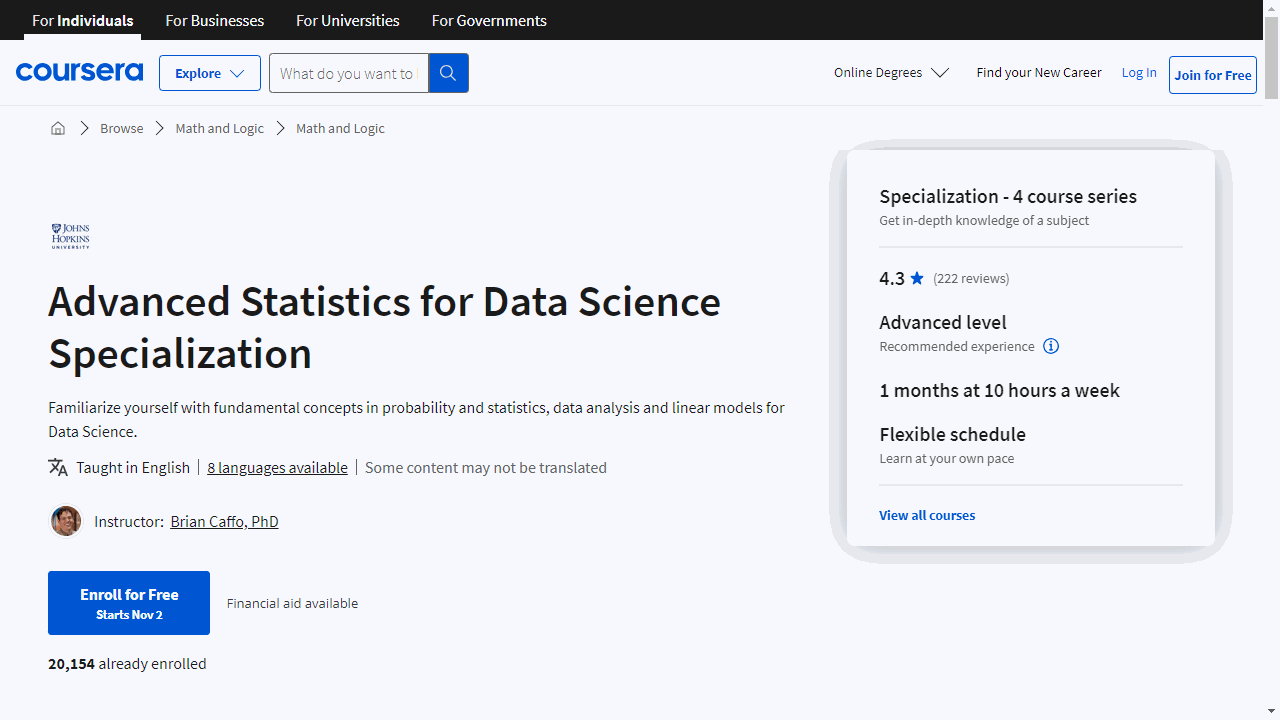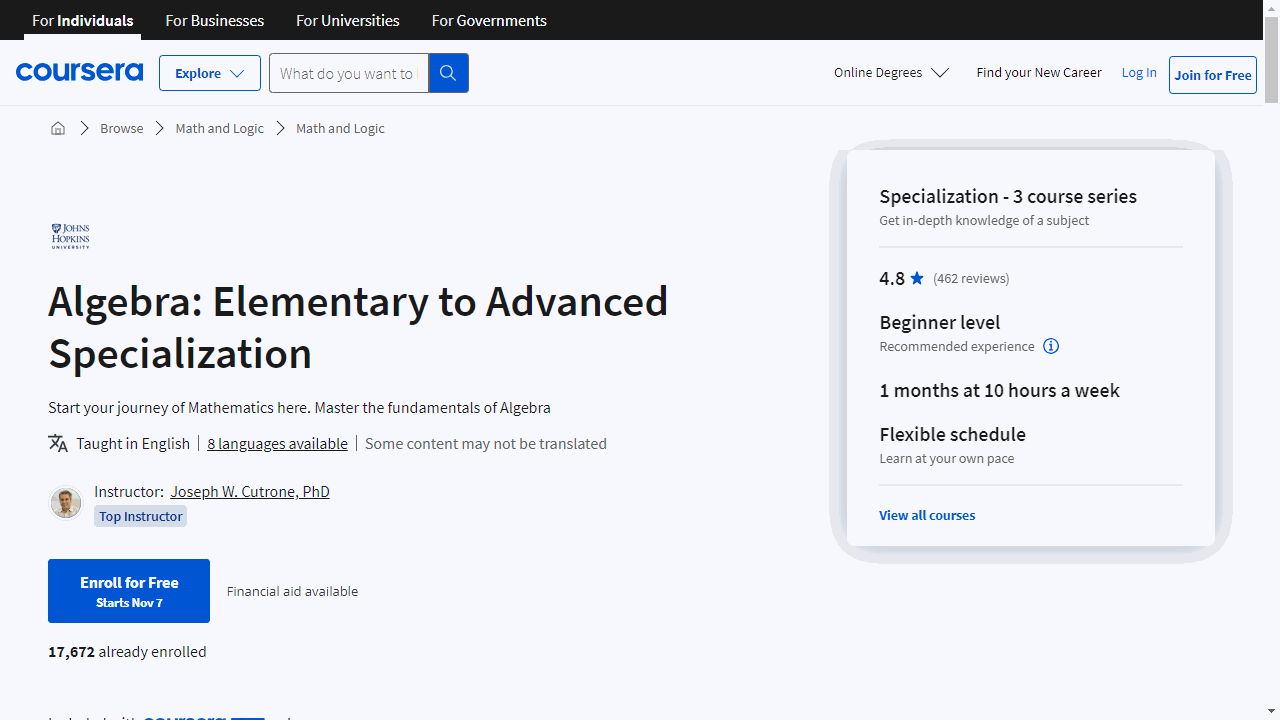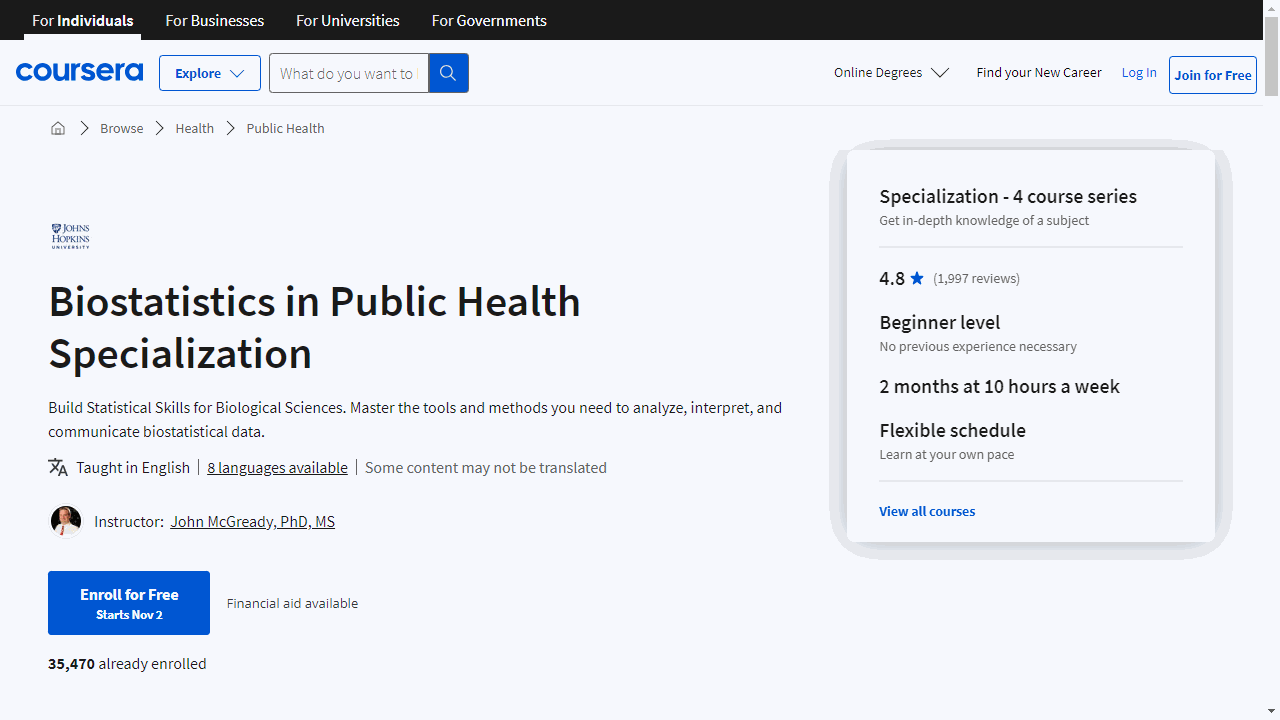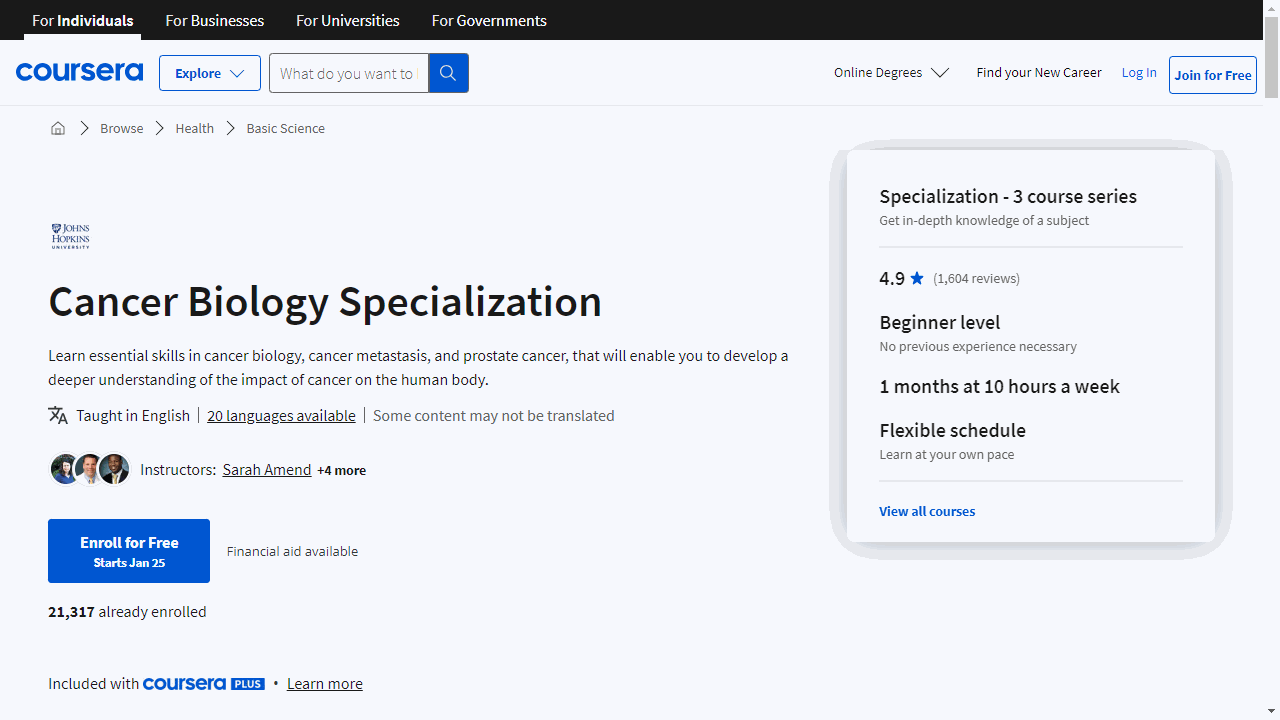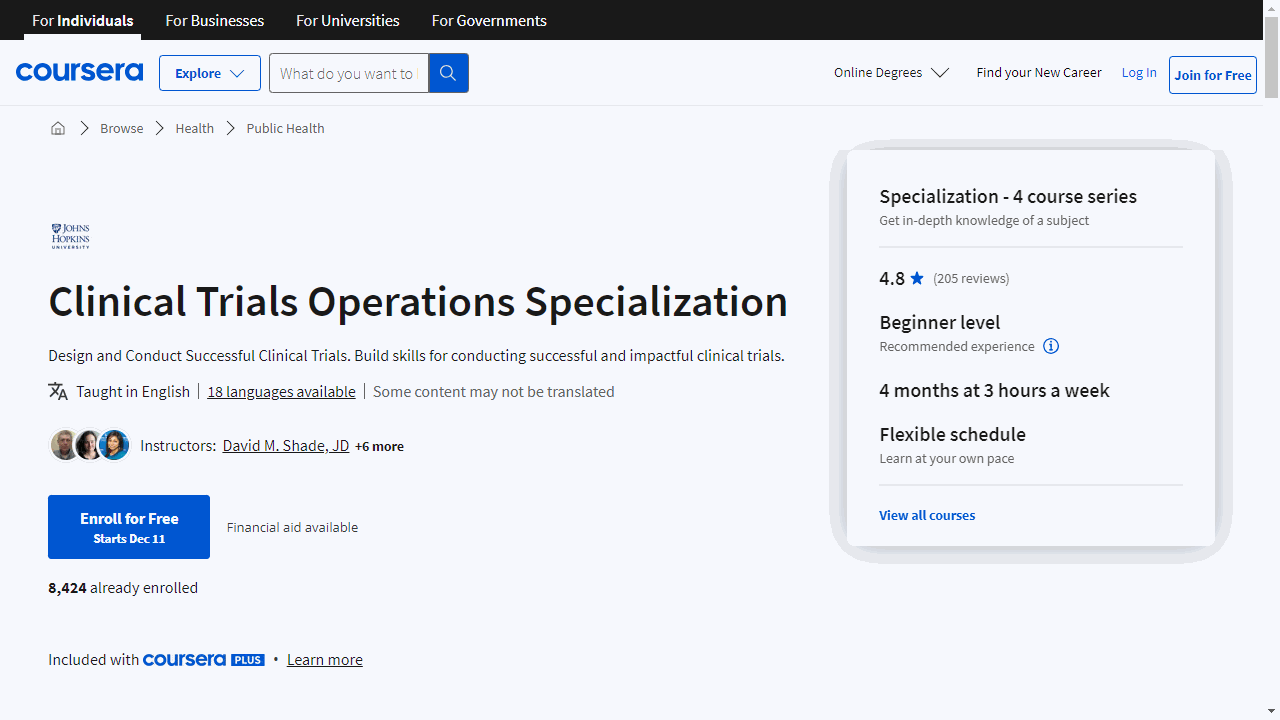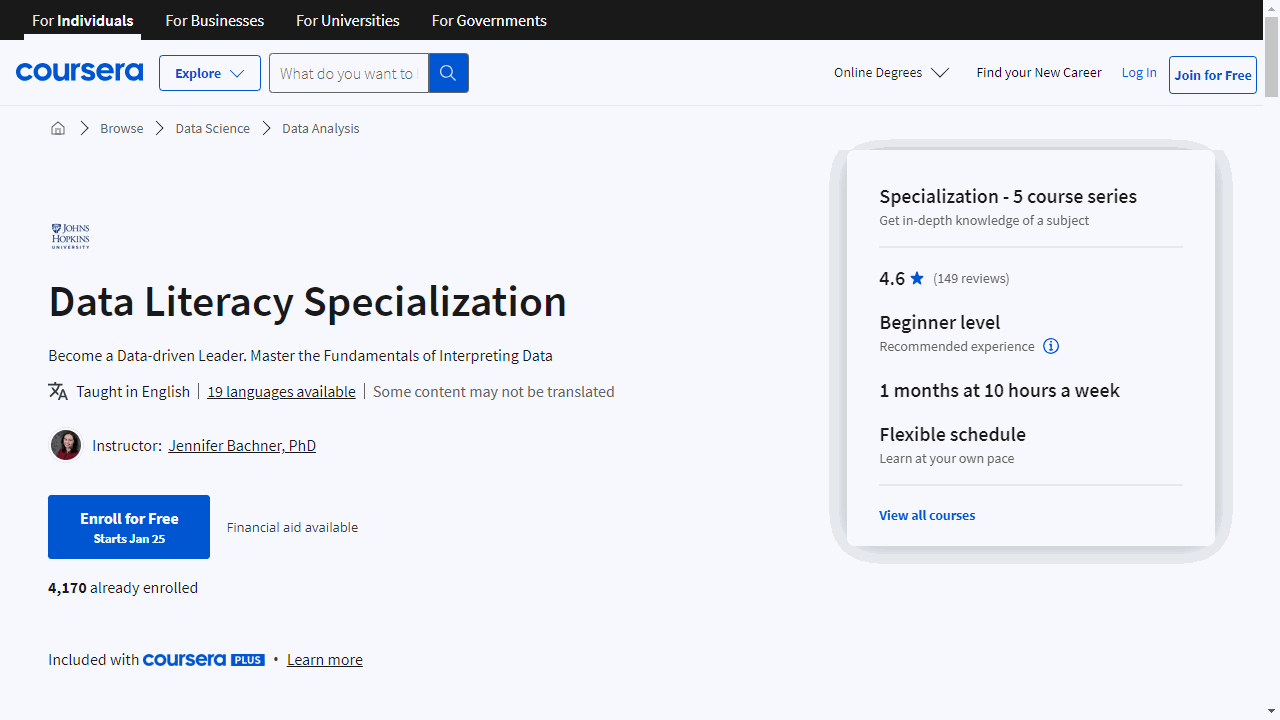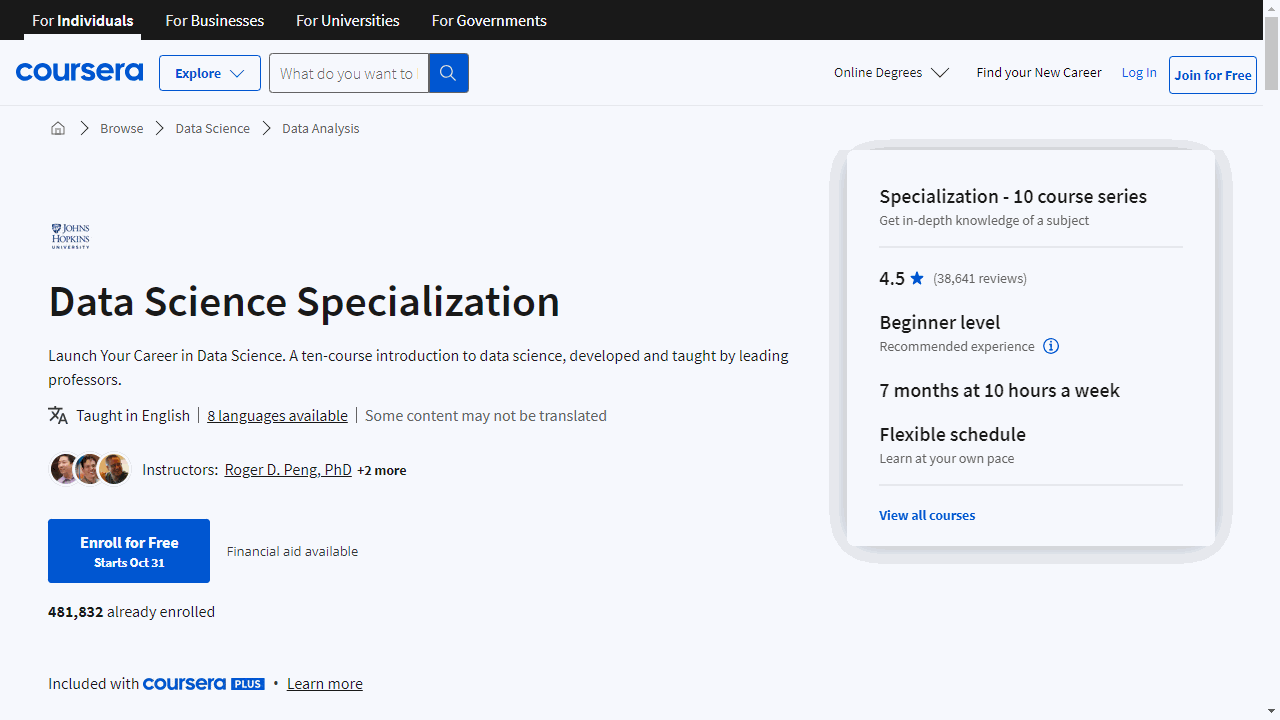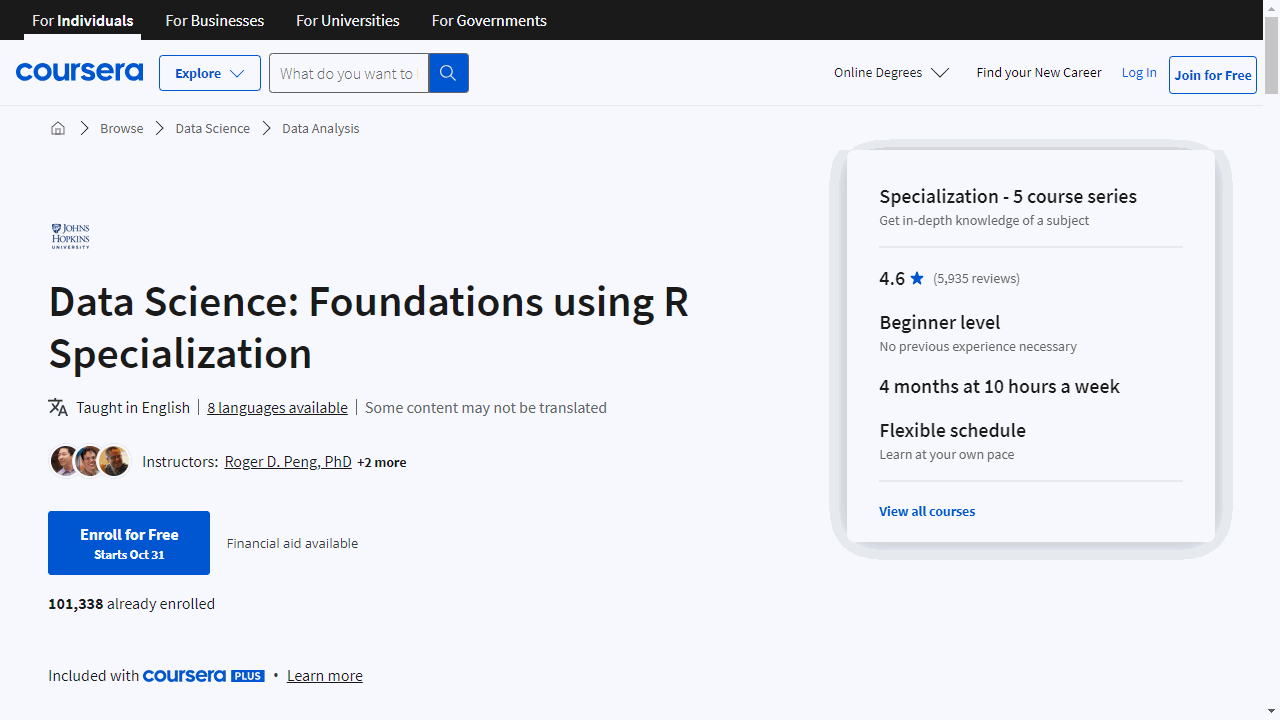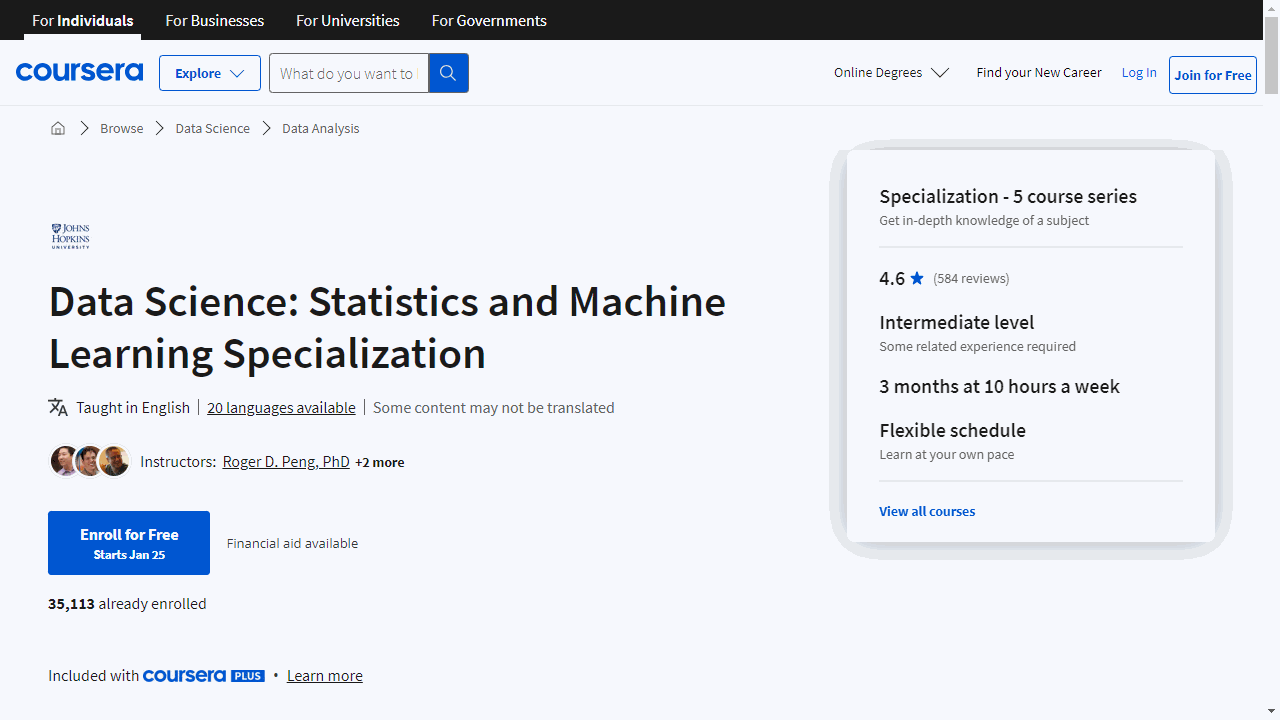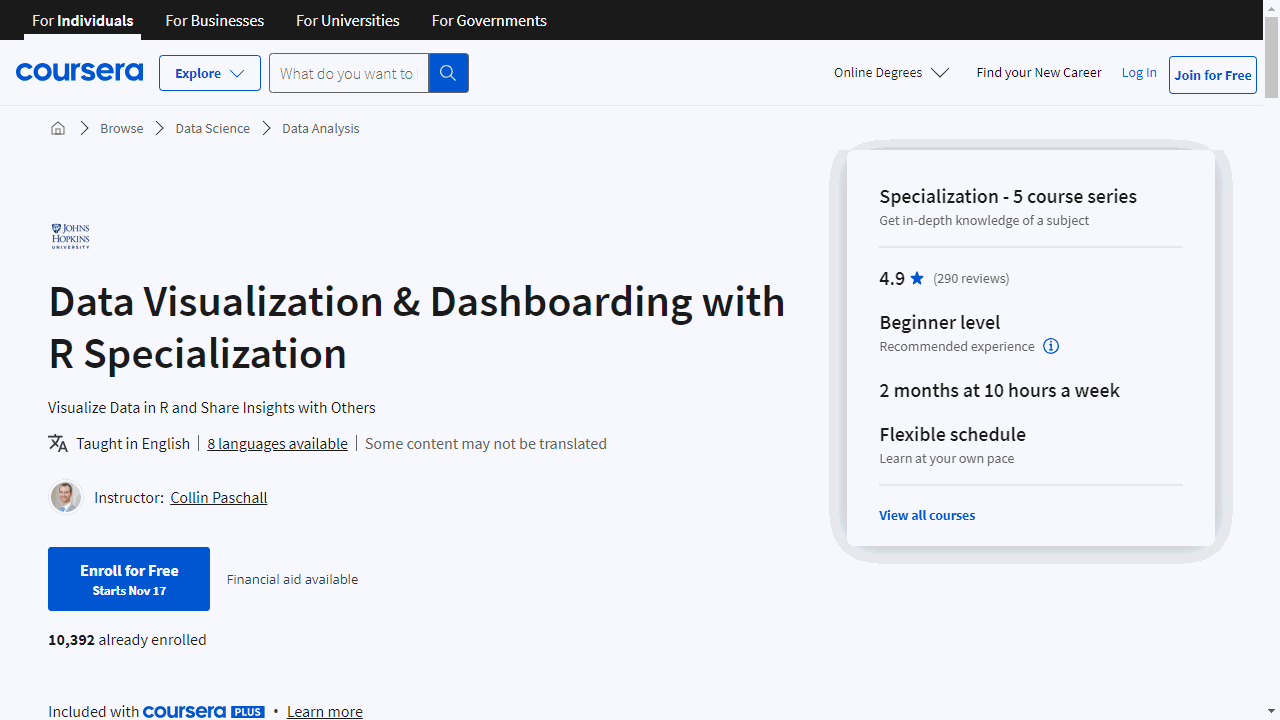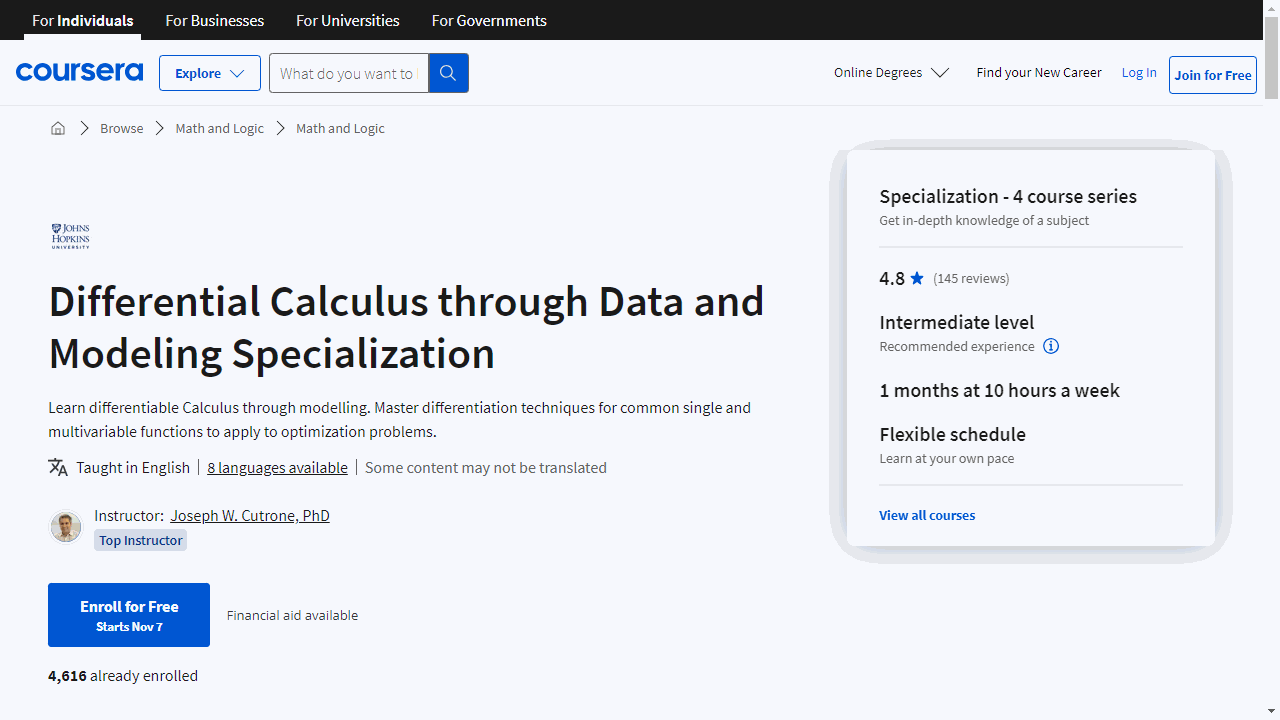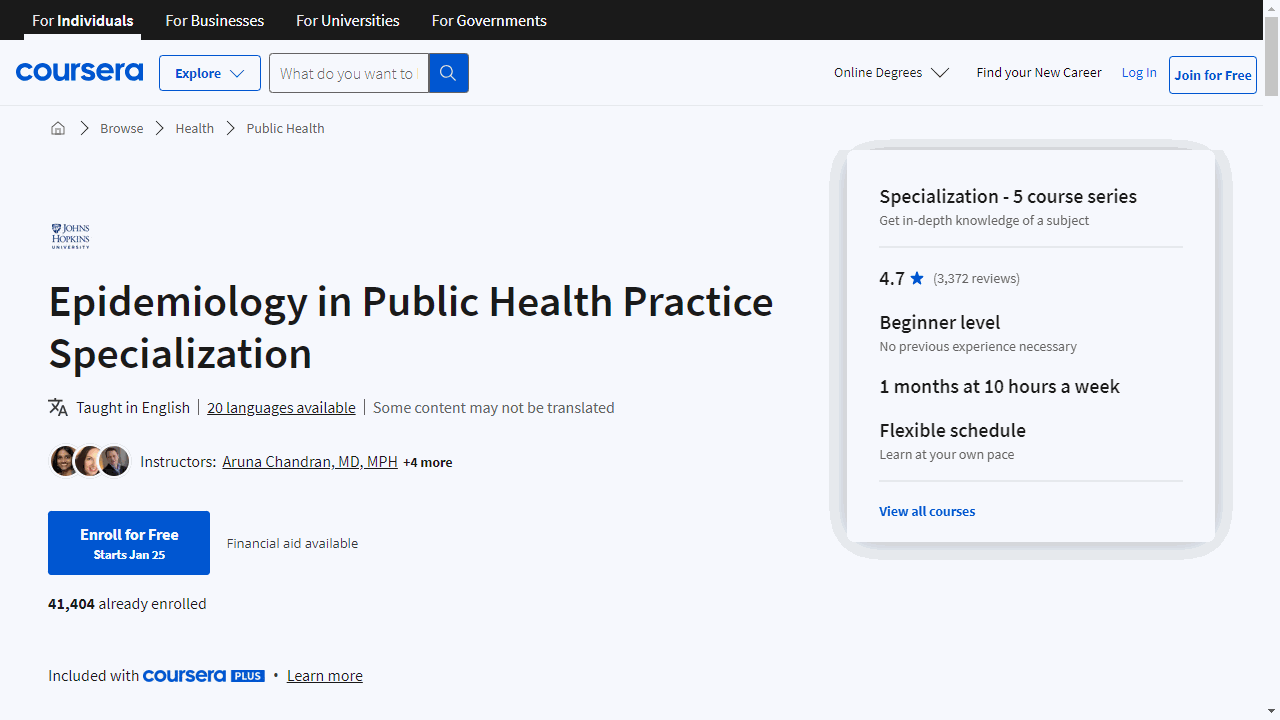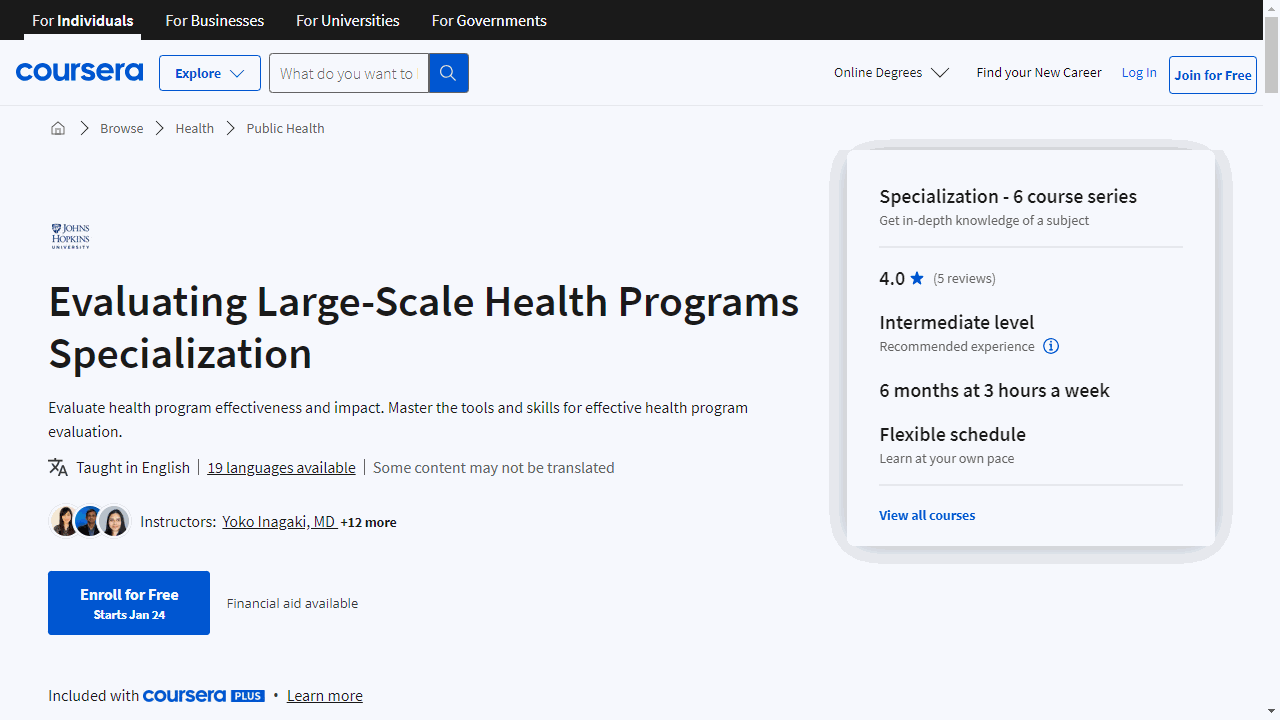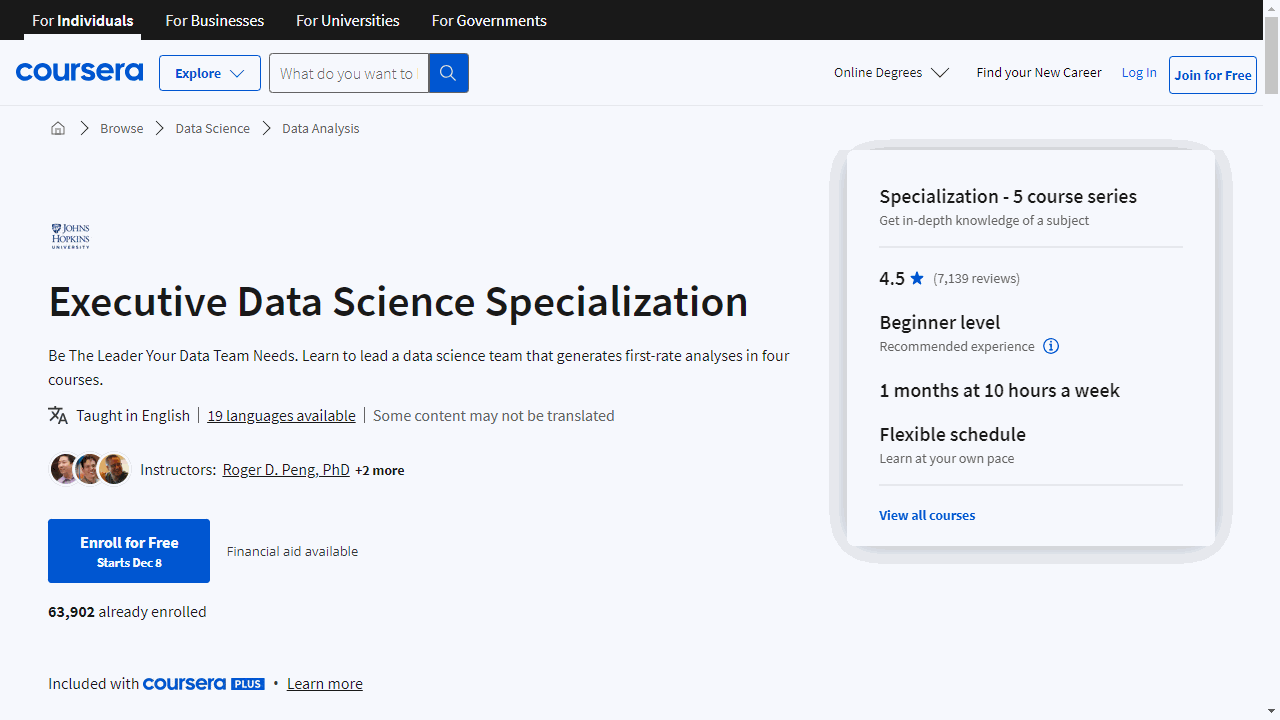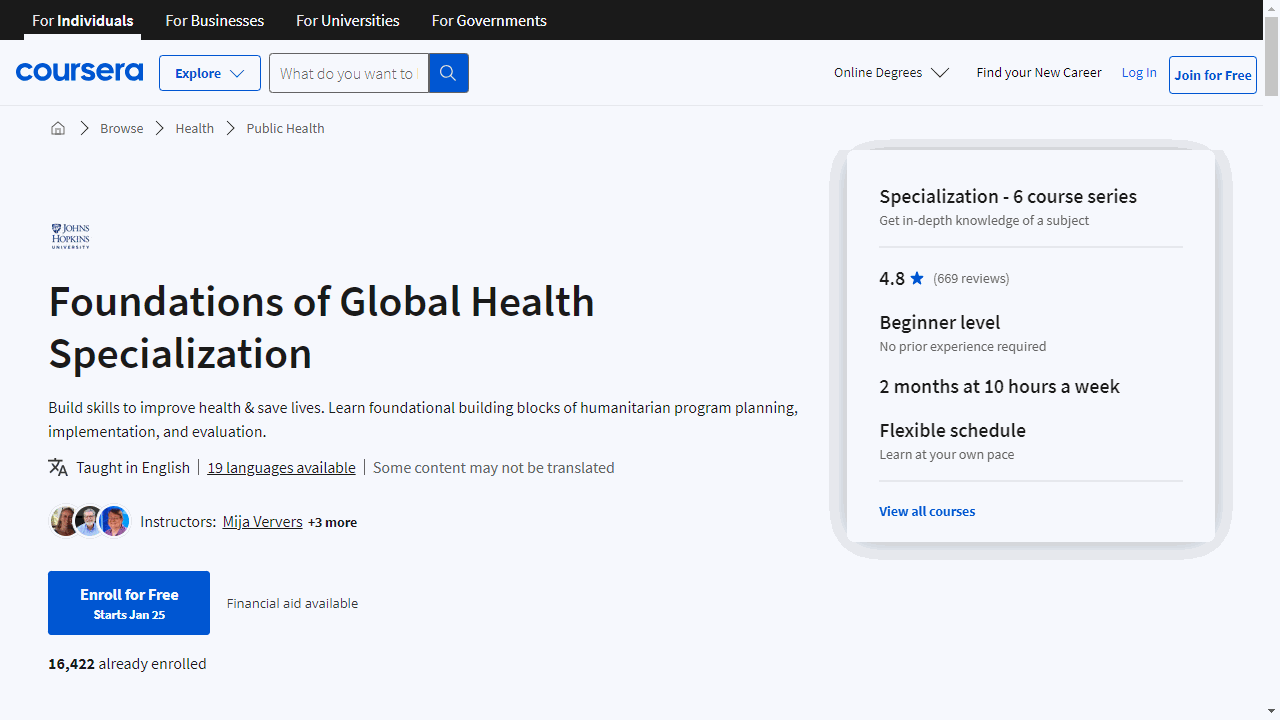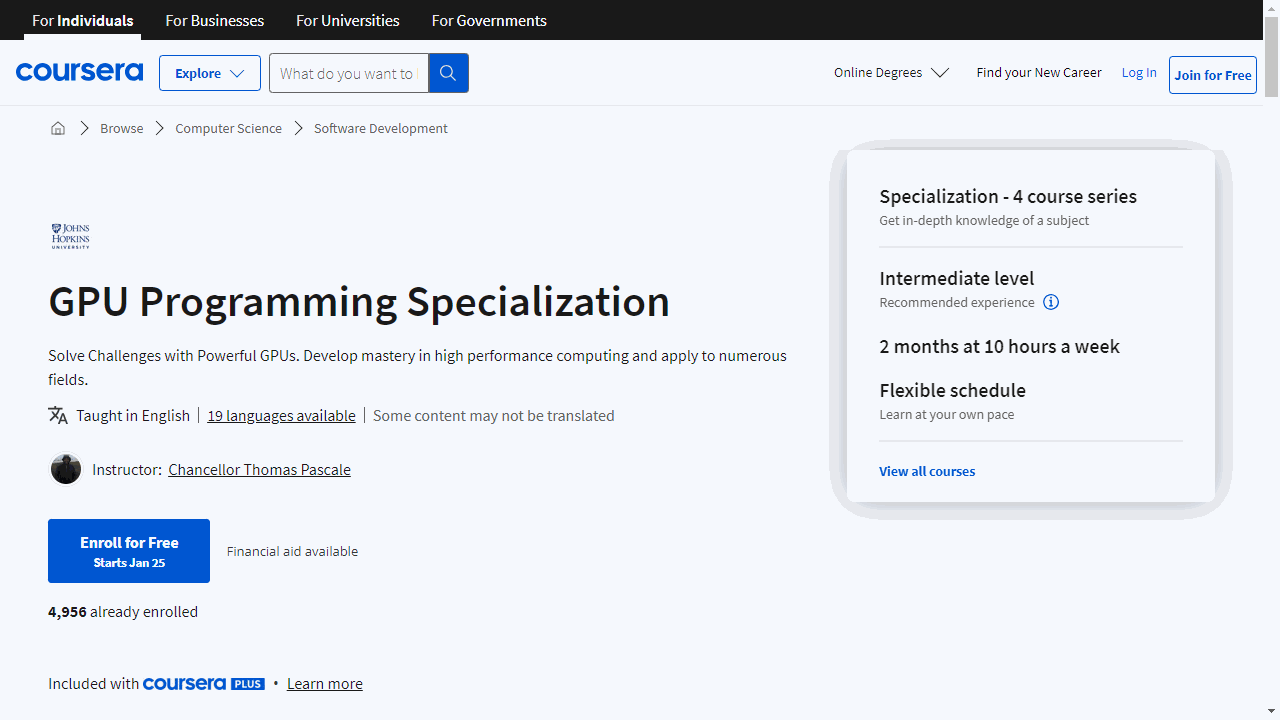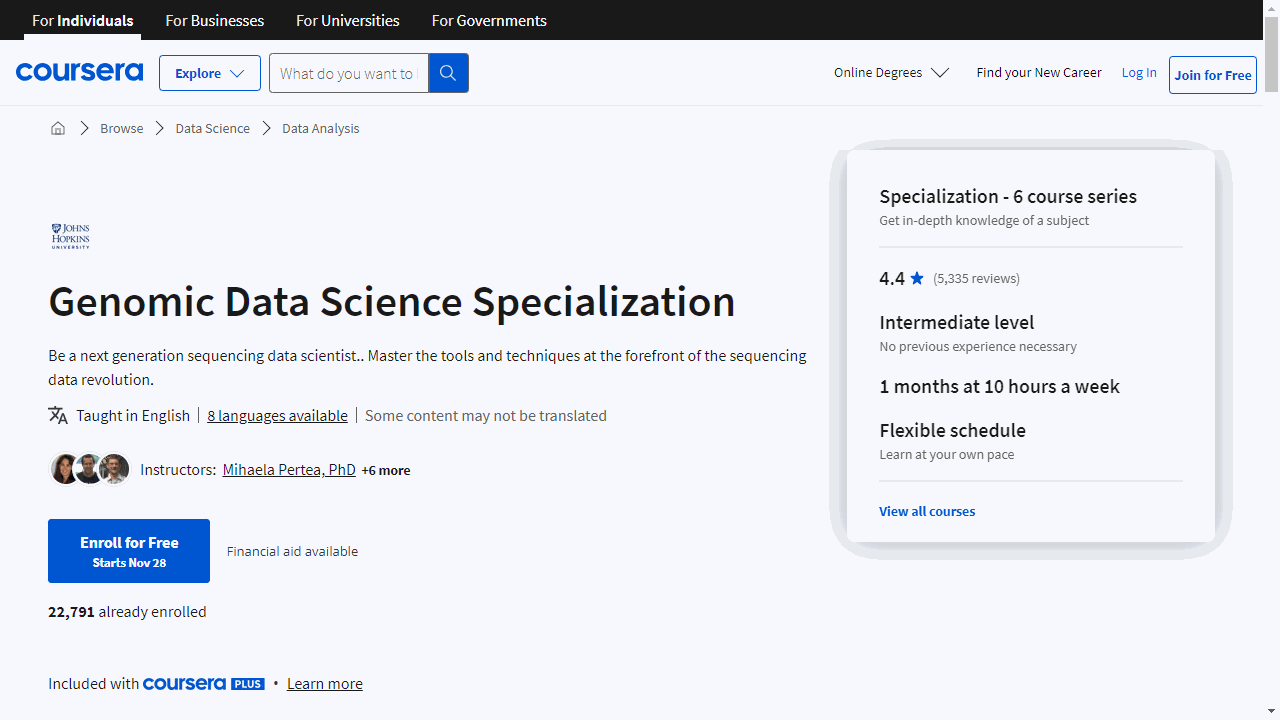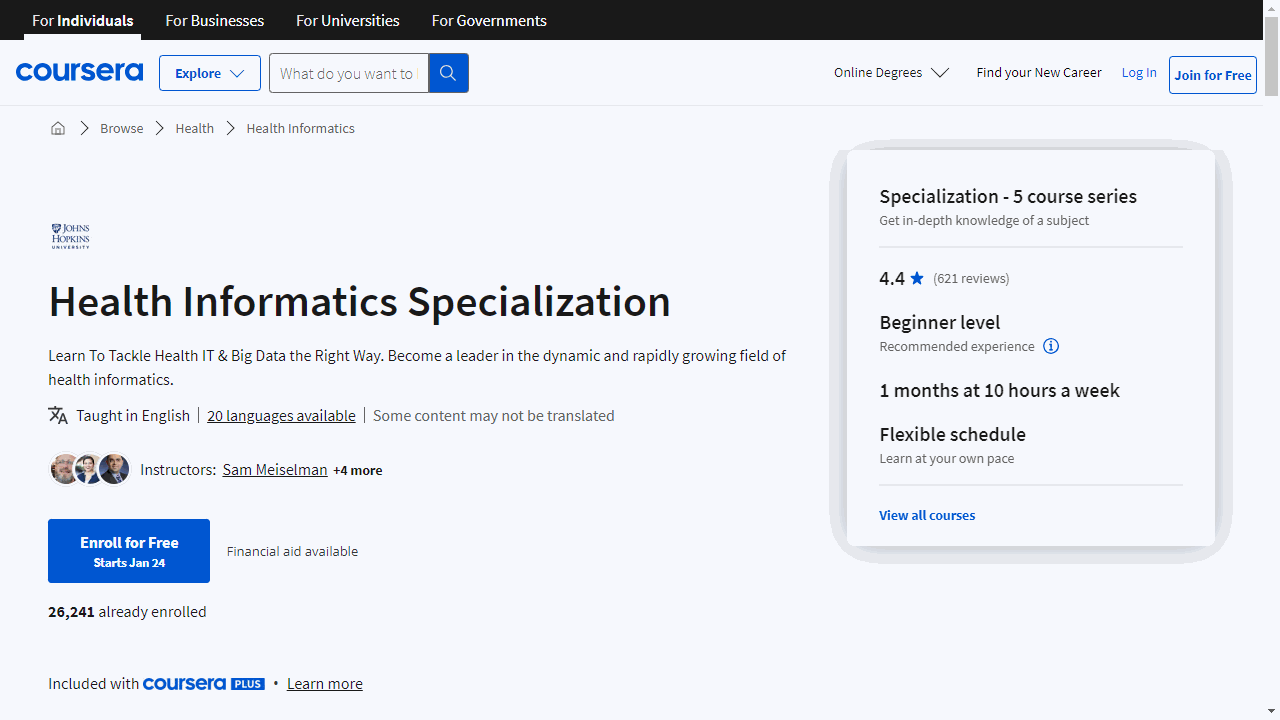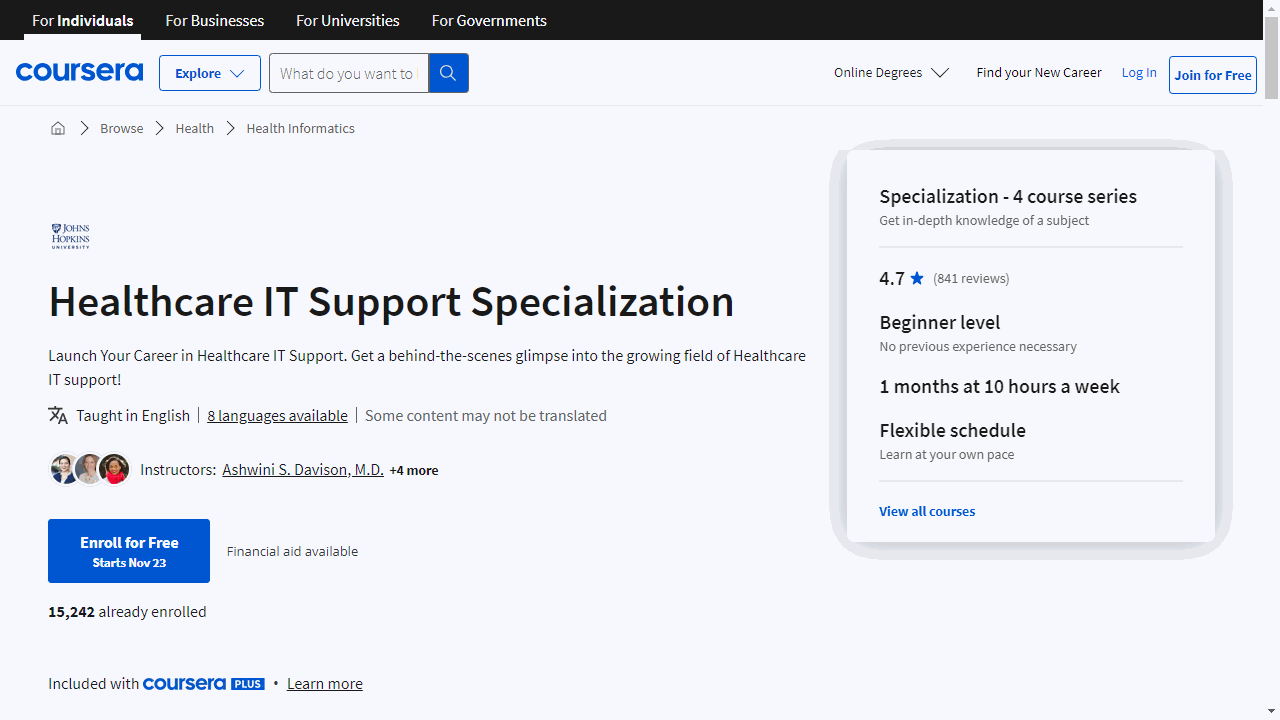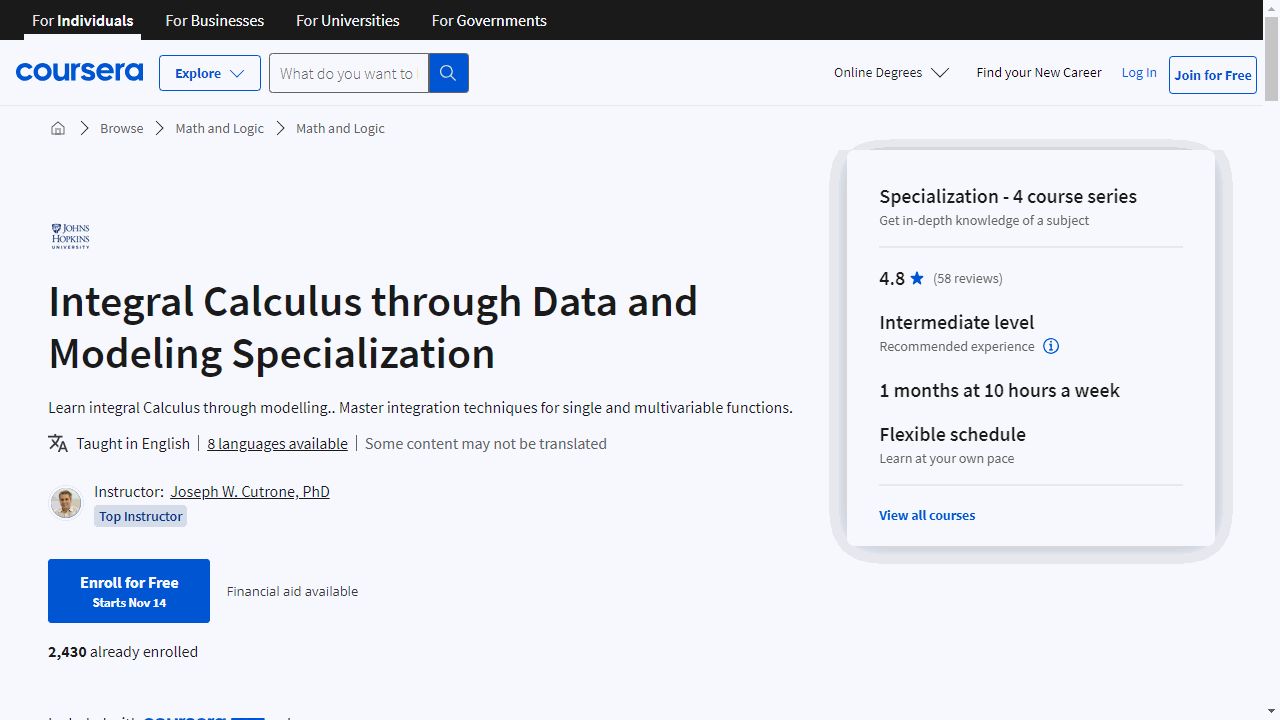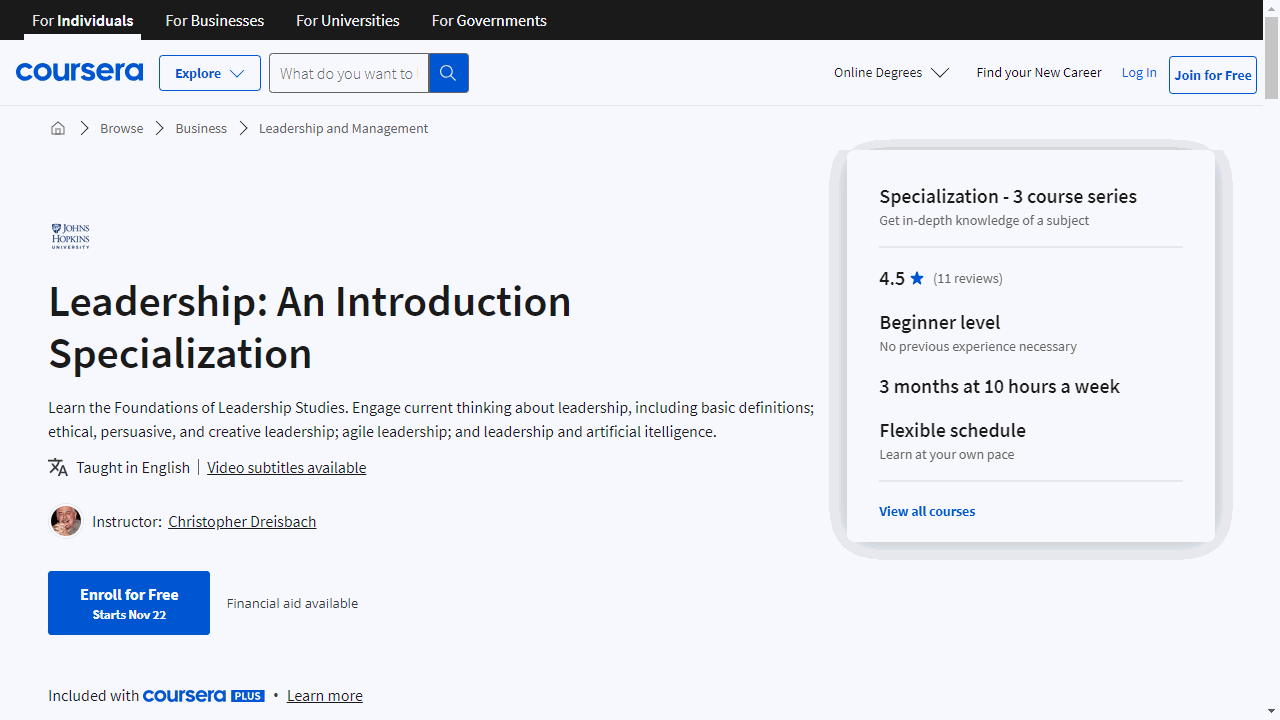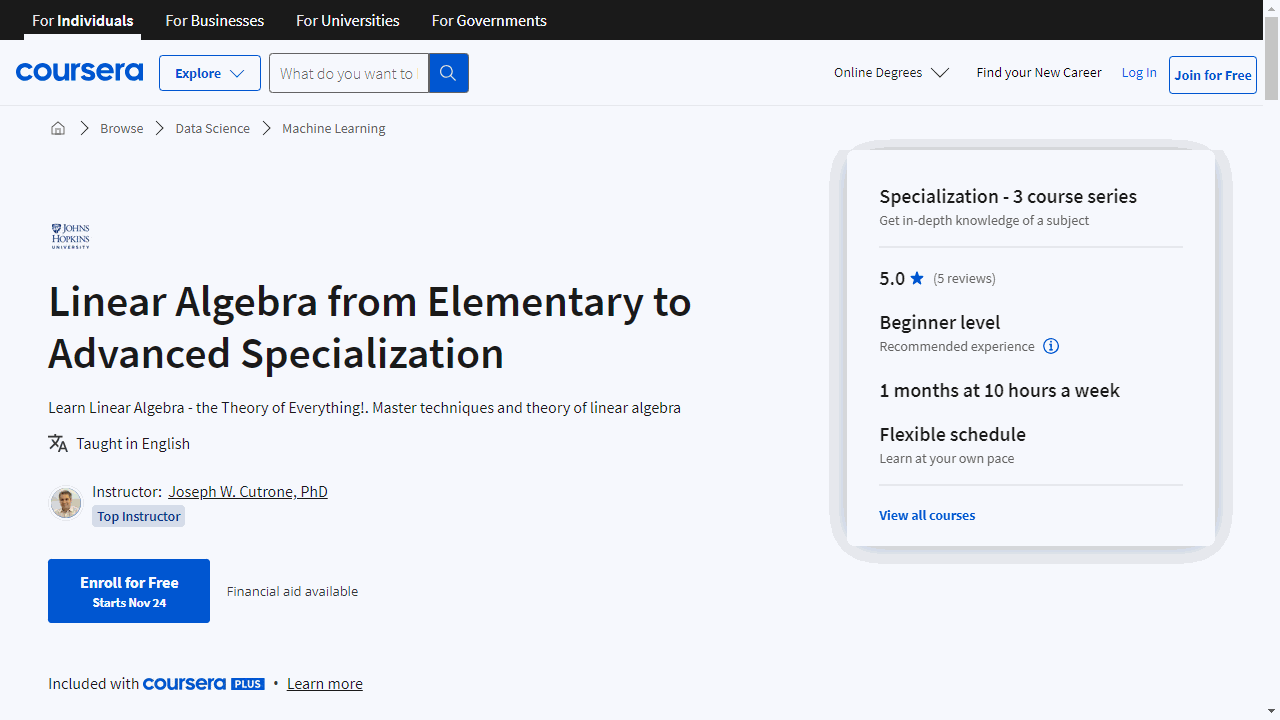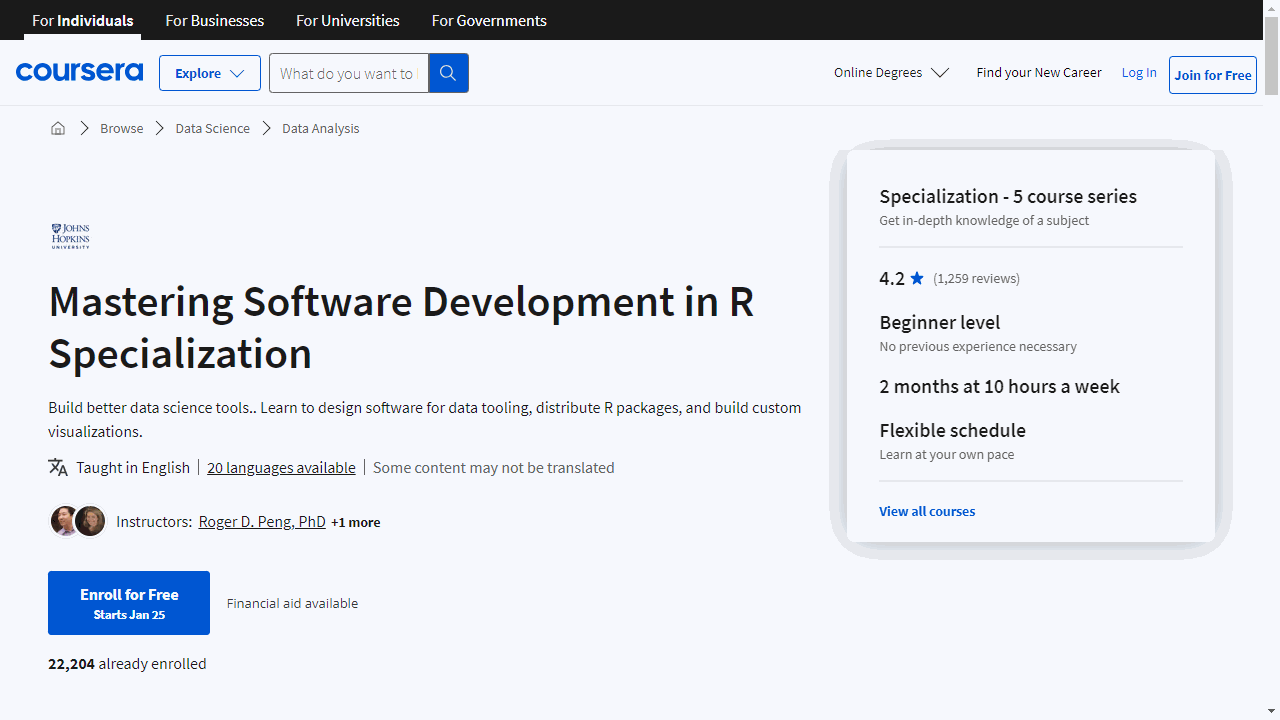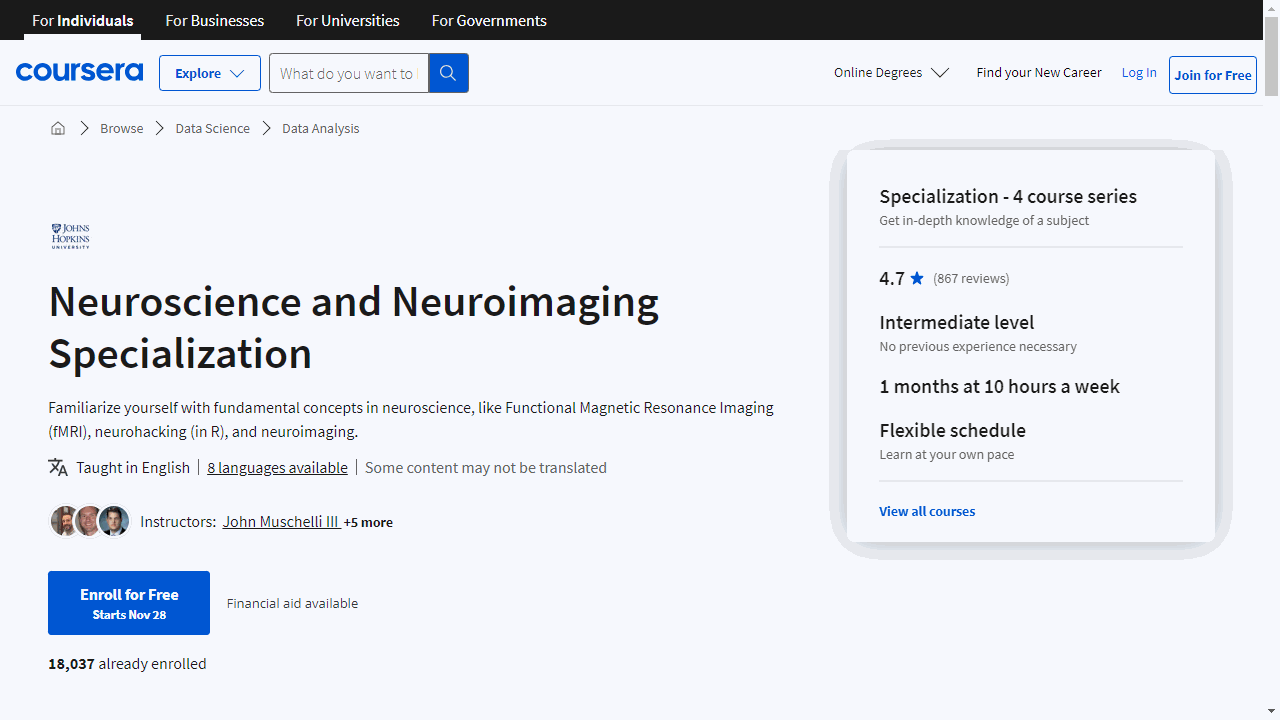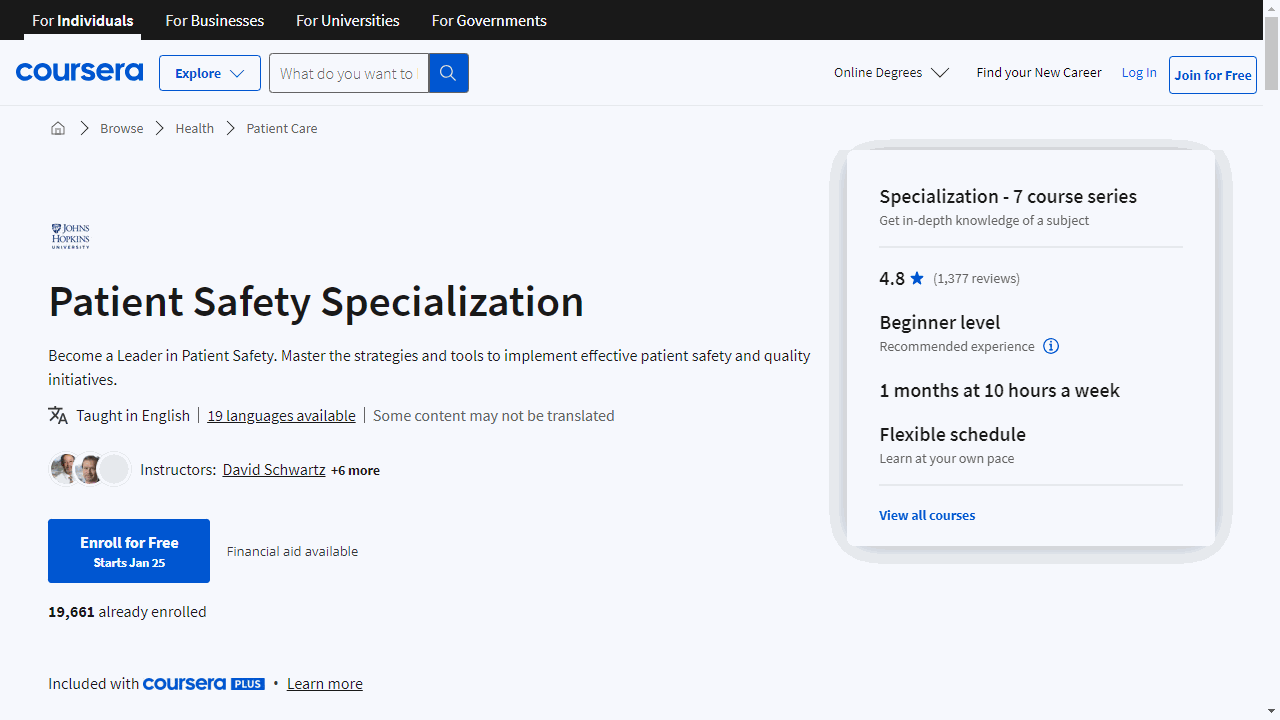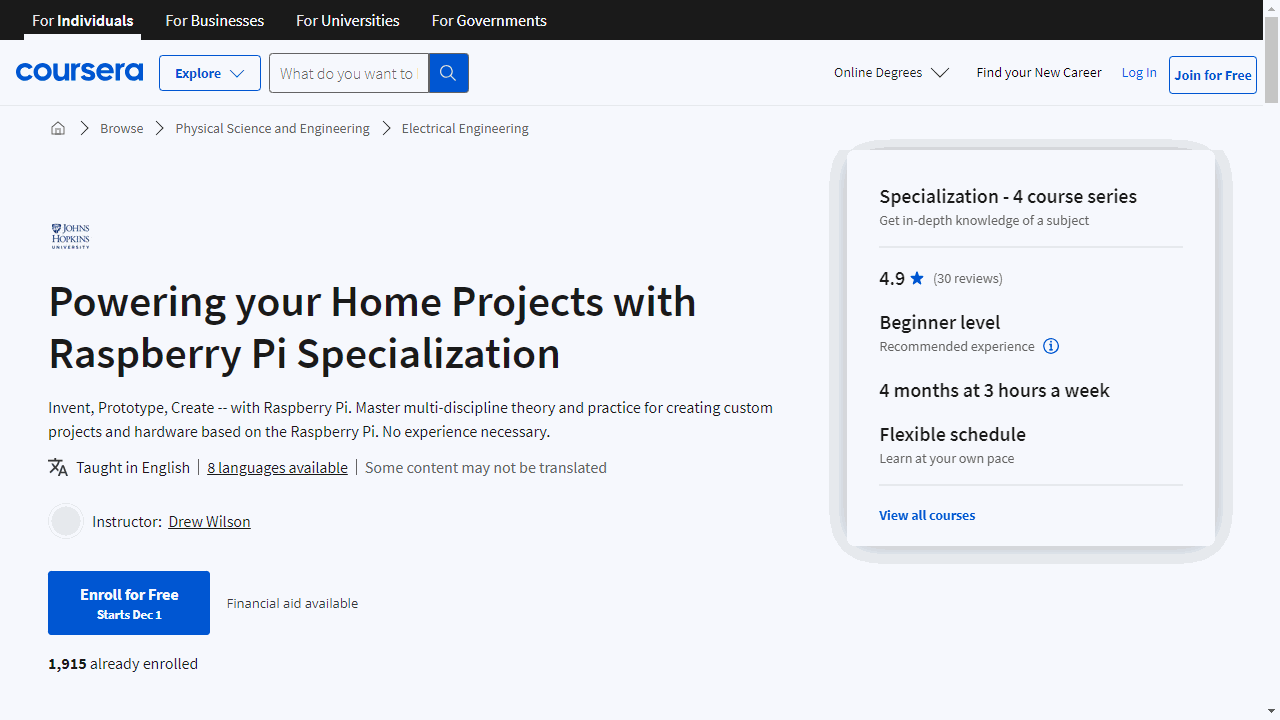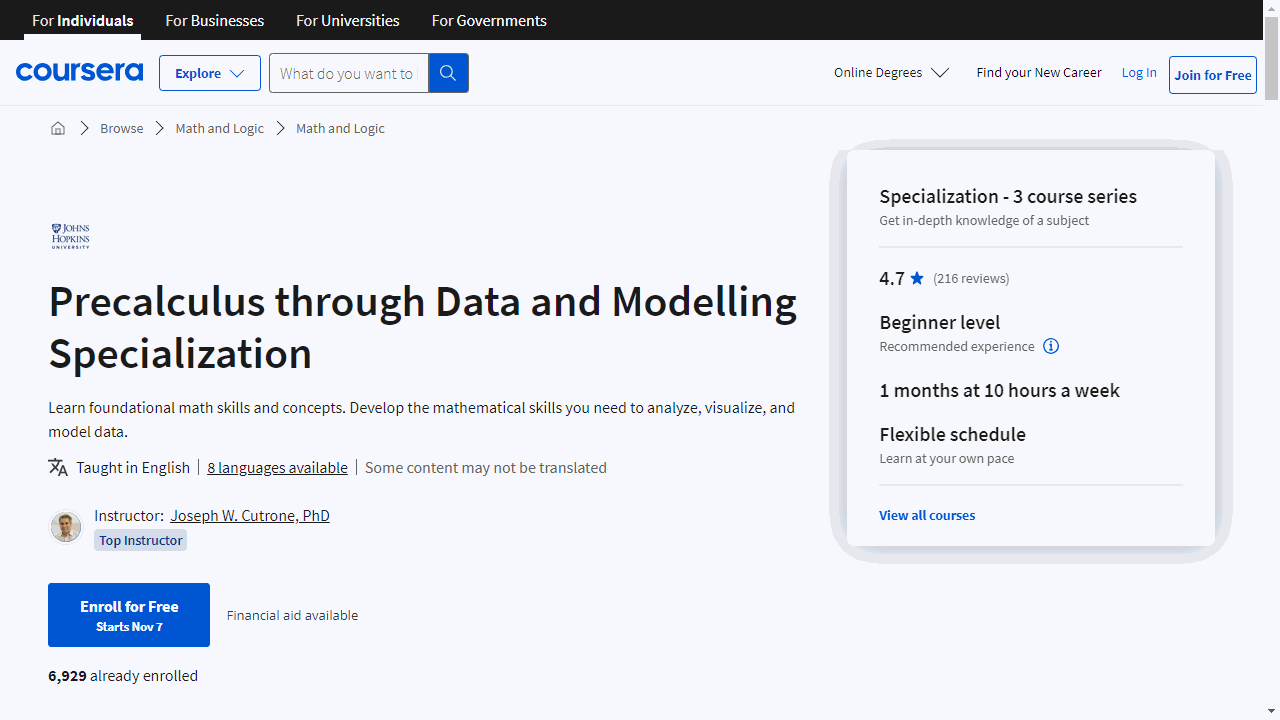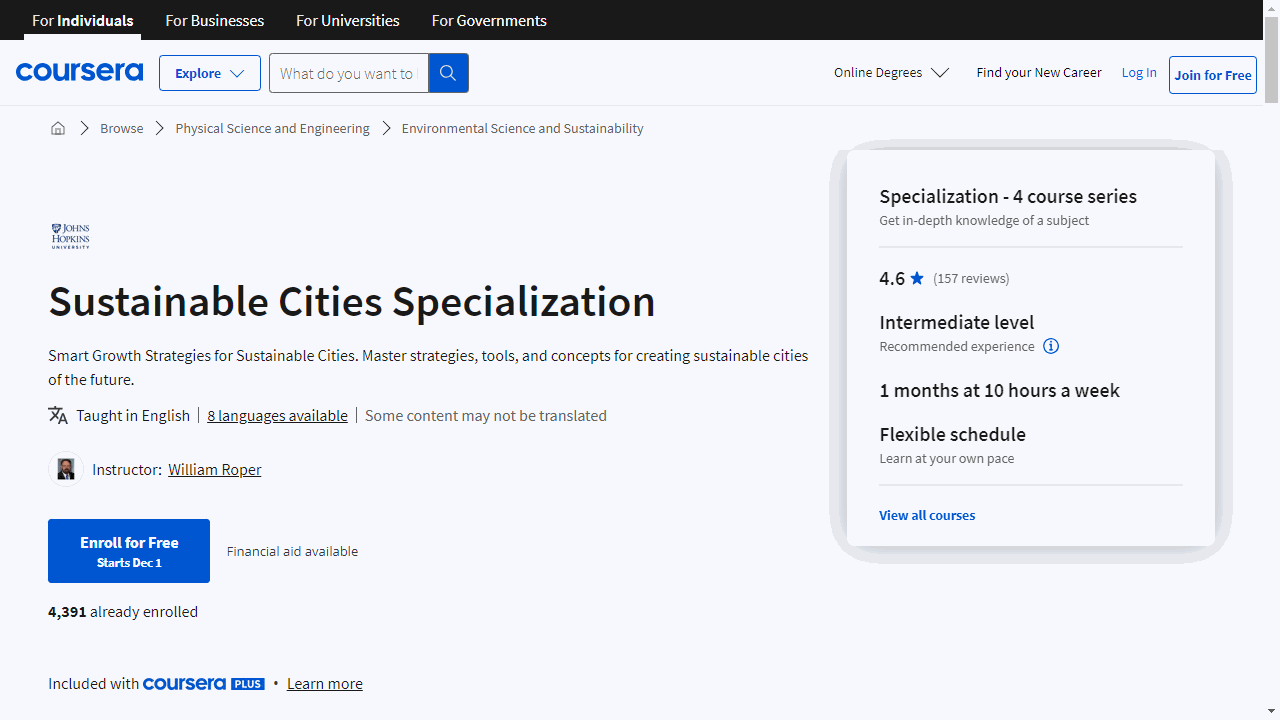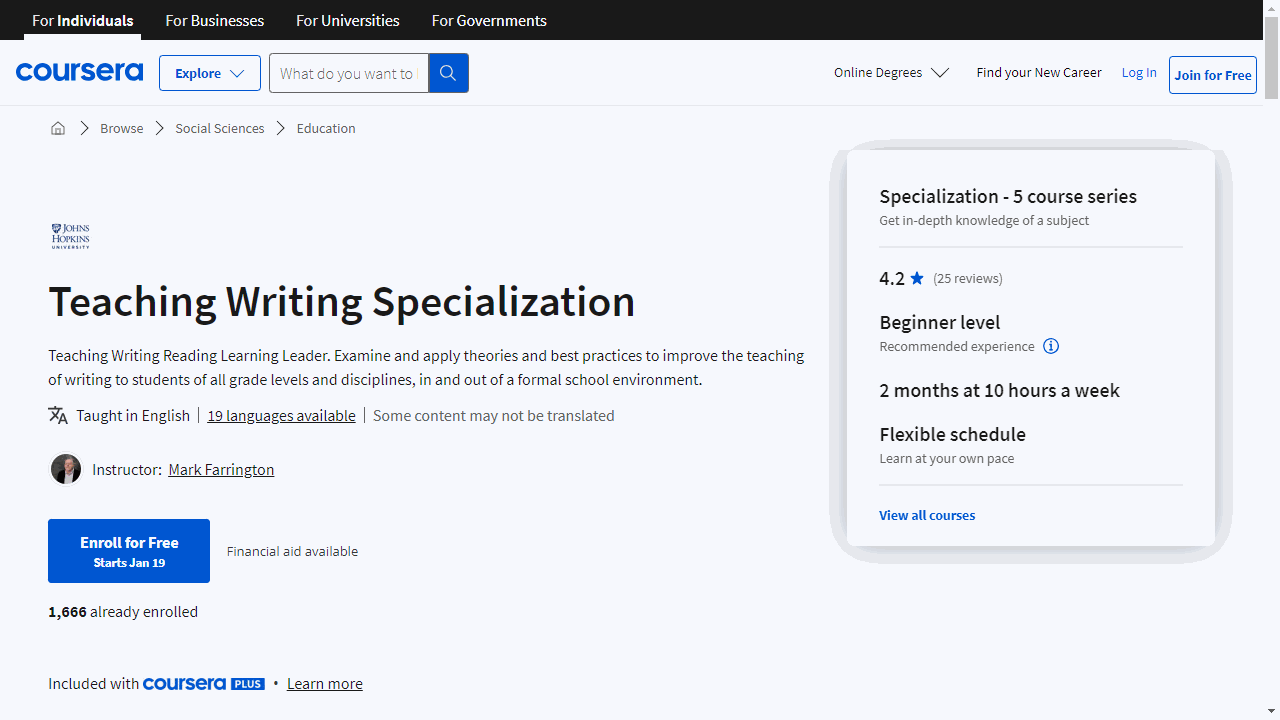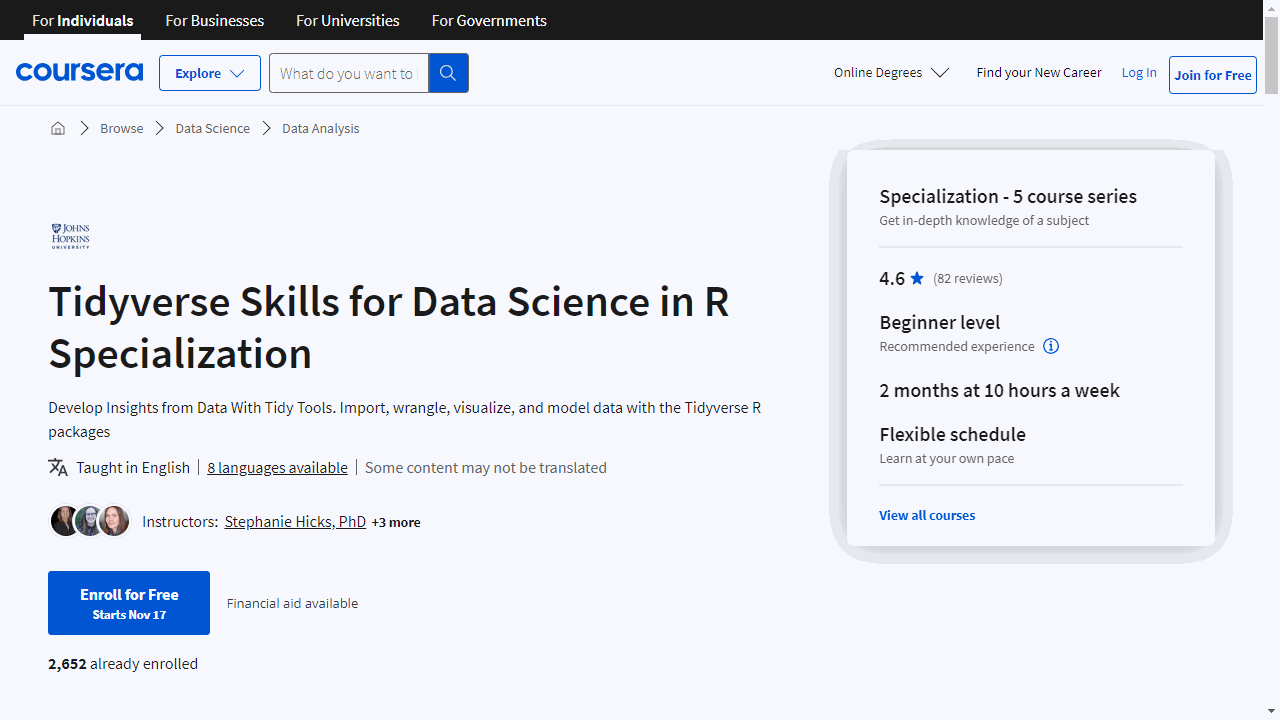Finding a Johns Hopkins University course on Coursera that’s perfect for you can be overwhelming, especially with so many great options to choose from.
You want a course that aligns with your interests and learning goals, while also providing engaging content from leading experts.
For the best Johns Hopkins University course overall on Coursera, we recommend the Data Science: Foundations using R Specialization.
This specialization offers a comprehensive introduction to the key tools and techniques used in data science, and it’s highly rated for its comprehensiveness, clear explanations, and practical programming assignments.
You’ll learn how to use R, a popular programming language for data analysis, to clean data, perform statistical analysis, and create visualizations.
But if this isn’t quite right for you, don’t worry!
This list includes a variety of other Johns Hopkins University courses that cover everything from public health to data visualization, genomics, and more.
Keep reading to discover a course that’s the perfect fit for you!
Advanced Statistics for Data Science Specialization
I took the courses in this specialization when they first launched, so they have a special place in my heart, although I believe the specializations above are more up-to-date and better structured.
The Mathematical Biostatistics Boot Camps provide a robust foundation in statistical analysis and probability theory.
You’ll gain proficiency in fundamental biostatistical methods like confidence intervals that data scientists rely on.
Building on that base, the Advanced Linear Models courses take you deeper into the math and theory underlying regression modeling.
You’ll gain linear algebra and calculus skills to thoroughly understand these pivotal data science techniques.
Through a blend of proofs, theory, and hands-on R programming, these linear model courses strengthen your applied stats abilities. You’ll be able to leverage regression models and methods with new rigor and expertise.
Even though it says “Biostatistics” in the title, this Specialization develops the advanced statistical chops today’s data science roles demand.
You’ll master techniques like hypothesis testing, regression modeling, and more with mathematical rigor.
Algebra: Elementary to Advanced Specialization
Starting with “Algebra: Elementary to Advanced - Equations & Inequalities,” you’ll establish a foundational grasp of algebra that’s essential for any further mathematical study.
This course covers the essentials, from the real number system to quadratic equations, and emphasizes the application of these concepts to real-world scenarios. It’s an excellent starting point for ensuring your computational methods are up to par and that you’re comfortable with algebraic formulas and properties.
Moving on to “Algebra: Elementary to Advanced - Functions & Applications,” the course shifts focus to the concept of functions, a cornerstone in algebra.
You’ll learn to identify and apply various types of functions, understanding their domains, ranges, and graphs. This course aims to enhance your problem-solving abilities by teaching you to analyze functions both algebraically and analytically, preparing you to tackle real-world problems with a strong mathematical approach.
The final course, “Algebra: Elementary to Advanced - Polynomials and Roots,” delves into more complex algebraic topics. It’s designed to refine your analytical skills, enabling you to make logical deductions and informed conclusions.
This course is particularly valuable for those planning to advance to calculus, statistics, or data science, as it focuses on the quantitative skills needed for evaluating arguments and making predictions.
By the end of the specialization, you’ll have a comprehensive set of algebra skills that are applicable to both academic pursuits and real-world problem-solving.
Biostatistics in Public Health Specialization
Provider: Johns Hopkins University
These statistics courses from Coursera will give you the skills you need to analyze and interpret data in public health research.
The specialization covers everything from summary measures to regression analysis.
The first course teaches you statistics basics like calculating summary measures and visualizing data.
You’ll get hands-on practice analyzing real published studies. By the end, you’ll be able to interpret data visualizations and summarize continuous and binary data.
The second course focuses on hypothesis testing and sampling methods.
You’ll learn to evaluate sample variability and calculate confidence intervals. This allows you to make statistical inferences from samples to whole populations. You’ll also master p-values for hypothesis testing.
The third course introduces simple linear regression.
You’ll determine the relationship between an outcome and a single predictor. This is key for modeling how variables impact each other. You’ll also learn to recognize confounding factors that distort statistical analysis.
The fourth course expands on regression analysis with multiple predictors.
You’ll predict an outcome based on several variables, which is crucial for public health research. The course also covers advanced regression techniques like splines and adjustments.
With these comprehensive courses, you’ll gain an in-demand skillset for public health.
The focus on practical data analysis skills prepares you to interpret and conduct statistical research.
Cancer Biology Specialization
Provider: Johns Hopkins University
This series of courses deepens your understanding of cancer, its mechanisms, and treatments, making it ideal for aspiring cancer researchers or healthcare professionals aiming to broaden their knowledge base.
The specialization kicks off with “Introduction to the Biology of Cancer,” where you’ll dive into the molecular biology underpinning cancer, including the critical roles of oncogenes and tumor suppressor genes.
It thoroughly covers the biological hallmarks of cancer, diagnosis, staging, and treatment strategies, alongside the risk factors for the world’s major cancers.
Completing this course equips you with the ability to identify key cancer types, understand genetic contributions to cancer, and grasp the metastatic process and the significance of imaging in cancer management.
Following that, “Understanding Cancer Metastasis” focuses on the spread of cancer, a central challenge in its treatment.
This course demystifies the theories of metastasis, the biology driving it, and its impact on patients, providing essential knowledge for those committed to combating cancer.
The specialization also includes “Understanding Prostate Cancer,” led by Professor Ken Pienta, an expert with over 25 years of experience in prostate cancer research and treatment.
This course zeroes in on prostate cancer biology, screening, staging, and treatment options for various disease stages.
Clinical Trials Operations Specialization
Provider: Johns Hopkins University
This set of courses equips you with the hands-on skills essential for clinical trial success, ready to contribute to impactful medical research.
Start with “Design and Conduct of Clinical Trials” to learn the nuts and bolts of trial design.
You’ll master randomization, understand how to minimize bias, and grasp the ethical considerations of participant recruitment.
These are the building blocks for producing credible trial results.
Move on to “Clinical Trials Data Management and Quality Assurance” where you’ll tackle the challenge of managing vast amounts of trial data.
Learn to collect, clean, and safeguard data, ensuring its integrity.
You’ll also become adept at implementing quality checks to maintain the highest standards.
In “Clinical Trials Management and Advanced Operations,” you’ll delve into the complexities of trial management.
From handling protocol events to promoting transparency and reproducibility, this course prepares you to maintain the safety and integrity of your research.
Finally, “Clinical Trials Analysis, Monitoring, and Presentation” teaches you to calculate sample sizes, monitor trial progress, and analyze results.
You’ll also learn to effectively communicate your findings, a critical skill for any researcher.
Throughout these courses, key entities like adaptive designs, systematic review, and meta-analysis are not just buzzwords—they’re tools you’ll use to refine your research.
You’ll leave with a deep understanding of the clinical trial process, from the importance of de-identifying data to ensuring compliance with regulations.
Data Literacy Specialization
Provider: Johns Hopkins University
This series of courses guides you through the essentials of data analysis, making complex concepts accessible and actionable.
Starting with “Data – What It Is, What We Can Do With It,” you’ll gain a solid foundation in interpreting data, understanding descriptive statistics, causal analyses, and crafting effective visualizations.
This course is perfect if you aim to navigate the data-driven landscape of modern decision-making with confidence.
Moving on, “Measurement – Turning Concepts into Data” teaches you how to quantify abstract concepts like health or trust.
Through lessons on survey design, sampling, and evaluation, you’ll learn to develop measures that are both reliable and valid, ensuring your data analysis stands on firm ground.
In “Quantifying Relationships with Regression Models,” you’ll explore the linear regression model, a cornerstone for analyzing relationships between variables.
This course empowers you to build, interpret, and evaluate multivariate regression analyses, crucial for predictive modeling and understanding variable impacts.
“What are the Chances? Probability and Uncertainty in Statistics” demystifies probability and statistical significance, teaching you to measure and describe confidence in your findings.
This knowledge is vital for accurately interpreting data and understanding the limits of your analyses.
The specialization culminates with the “Data Literacy Capstone – Evaluating Research,” where you apply your newfound skills to critically evaluate quantitative research.
This hands-on project solidifies your role as a knowledgeable consumer and practitioner of quantitative analysis.
Each course in this specialization from Johns Hopkins University equips you with key skills—ranging from survey design, statistical analysis, and data visualization to regression, hypothesis testing, and beyond.
By the end, you’ll not only understand the language of data but also how to apply this knowledge in real-world scenarios, making informed decisions based on solid evidence.
JHU Data Science Specialization
This specialization is great if you are particularly interested in R programming.
Starting with “The Data Scientist’s Toolbox”, you’ll get a solid introduction to the main tools and ideas in the data scientist’s toolbox.
This course is a great starting point, providing a conceptual introduction to turning data into actionable knowledge. You’ll learn how to set up R, R-Studio, Github, and other useful tools.
Next up is “R Programming”, where you’ll learn how to program in R and use it for effective data analysis.
This course is highly rated, with a focus on practical issues in statistical computing. You’ll learn how to configure statistical programming software and make use of R loop functions and debugging tools.
“Getting and Cleaning Data” covers the basics of obtaining and cleaning data, which is a crucial step before any data analysis can be performed.
You’ll learn how to obtain usable data from the web, APIs, and databases, and apply data cleaning basics to make data “tidy”.
The “Exploratory Data Analysis” covers essential techniques for summarizing data.
You’ll learn how to use advanced graphing systems such as the Lattice system and apply cluster analysis techniques to locate patterns in data.
“Reproducible Research” focuses on the concepts and tools behind reporting modern data analyses in a reproducible manner.
This course is becoming increasingly important as data analyses become more complex. You’ll learn how to organize data analysis to help make it more reproducible and publish reproducible web documents using Markdown.
“Statistical Inference” is a practical course that presents the fundamentals of inference in a practical approach for getting things done.
You’ll learn how to use p-values, confidence intervals, and permutation tests, and make informed data analysis decisions.
“Regression Models” is a comprehensive course that covers regression analysis, least squares, and inference using regression models.
You’ll learn how to use regression analysis, understand ANOVA and ANCOVA model cases, and investigate analysis of residuals and variability.
“Practical Machine Learning” covers the basic components of building and applying prediction functions with an emphasis on practical applications.
You’ll learn how to use the basic components of building and applying prediction functions and describe machine learning methods such as regression or classification trees.
“Developing Data Products” is a unique course that covers the basics of making your work available to decision-makers through data products using Shiny, R packages, and interactive graphics.
You’ll learn how to develop basic applications and interactive graphics using GoogleVis and create a data product that tells a story to a mass audience.
Finally, the “Data Science Capstone” allows you to apply everything you’ve learned in a real-world project.
This is a great opportunity to create a usable/public data product that can be used to show your skills to potential employers.
Data Science: Foundations using R Specialization
The first course in this specialization, offered by Johns Hopkins University, The Data Scientist’s Toolbox, introduces you to the main tools and ideas that data scientists work with.
You’ll learn how to set up R, R-Studio, Github, and other useful tools.
You’ll also gain a solid understanding of the data, problems, and tools that data analysts use.
Next up is R Programming.
This course will teach you how to program in R and how to use R for effective data analysis.
You’ll learn how to install and configure software necessary for a statistical programming environment.
The course also covers practical issues in statistical computing, including programming in R, reading data into R, accessing R packages, writing R functions, debugging, and profiling R code.
The third course, Getting and Cleaning Data, focuses on the basics of obtaining and cleaning data.
You’ll learn how to obtain data from various sources, including the web, APIs, and databases.
You’ll also learn how to make data “tidy”, which can dramatically speed up downstream data analysis tasks.
The fourth course, Exploratory Data Analysis, covers the essential techniques for summarizing data.
You’ll learn about the plotting systems in R and the basic principles of constructing data graphics.
You’ll also learn about common multivariate statistical techniques used to visualize high-dimensional data.
The final course, Reproducible Research, focuses on the concepts and tools behind reporting modern data analyses in a reproducible manner.
You’ll learn how to organize data analysis to make it more reproducible and how to write up a reproducible data analysis using knitr.
Data Science: Statistics and Machine Learning Specialization
Provider: Johns Hopkins University
This Specialization equips you with essential data science skills through a series of well-structured courses.
The journey begins with “Statistical Inference,” where you’ll dive into the process of making sense of data to draw meaningful conclusions.
This course demystifies statistical modeling, confidence intervals, and p-values, empowering you to analyze data with confidence.
Moving on to “Regression Models,” you’ll explore how outcomes relate to predictors using linear assumptions.
This course covers regression analysis, ANOVA, and ANCOVA, teaching you to handle variability and model selection adeptly.
It’s perfect for mastering the statistical analysis tools vital for a data scientist.
“Practical Machine Learning” shifts the focus to prediction, covering the basics of building and applying prediction functions.
You’ll learn about training and test sets, tackle overfitting, and explore machine learning methods like regression and random forests.
This course is essential for applying machine learning to solve practical problems.
In “Developing Data Products,” you’ll learn to transform statistical analysis into interactive data products.
Through hands-on projects, you’ll use Shiny, R packages, and interactive graphics to create applications and visualizations that effectively communicate your data’s story.
The “Data Science Capstone” offers a culminating experience where you’ll apply your skills to create a public data product, showcasing your abilities to potential employers.
This project-based course is an invaluable opportunity to apply exploratory data analysis, model building, and presentation skills in a real-world scenario.
Data Visualization & Dashboarding with R Specialization
If you’re searching for a solid foundation in R programming with a focus on data visualization, the “Data Visualization & Dashboarding with R Specialization” on Coursera is a standout choice.
This series of courses is designed to equip you with the skills needed to turn data into compelling visual stories, a must-have ability in today’s data-driven world.
The journey begins with “Getting Started with Data Visualization in R.”
This course is tailored for those new to R, providing a gentle introduction to the language and its capabilities.
You’ll learn how to import data, use the tidyverse package for data manipulation, and create basic reports with R Markdown.
It’s an ideal starting point if you’re looking to get your feet wet without being overwhelmed.
As you progress to “Data Visualization in R with ggplot2,” you’ll build on your foundational knowledge.
This course zeroes in on the ggplot2 package, a versatile tool for crafting a wide array of visualizations.
You’ll learn to create and refine plots, focusing on the visual presentation of data rather than the underlying data management processes.
With “Advanced Data Visualization with R,” you’ll take your skills further.
This course introduces additional packages that enhance ggplot2, allowing you to create more sophisticated and varied visualizations, including spatial data representations and interactive elements.
It’s a deep dive into the possibilities of data visualization with R.
The fourth course, “Publishing Visualizations in R with Shiny and flexdashboard,” shifts the focus to sharing and presenting your work.
You’ll explore how to build interactive visualizations with Shiny and combine various R outputs into dashboards.
This course is about making your data not just insightful but also engaging and interactive for your audience.
The “Data Visualization Capstone” is the culmination of your learning experience.
Here, you’ll apply the skills you’ve acquired to a unique project, using real-world data to craft a narrative that’s both informative and visually appealing.
It’s your opportunity to demonstrate your ability to deliver a complete data visualization project from start to finish.
If you’re aiming to master data visualization in R, this specialization offers a structured and comprehensive path to achieving that goal.
Differential Calculus through Data and Modeling Specialization
If you’re searching for a comprehensive math course that seamlessly blends theoretical calculus with practical application, the “Differential Calculus through Data and Modeling Specialization” on Coursera is exactly what you need.
This series of courses is designed to not only build your mathematical foundation but also to demonstrate how these concepts are vital in analyzing real-world data.
Starting with “Calculus through Data & Modeling: Precalculus Review,” you’ll revisit essential functions, including polynomial and trigonometric, with a twist. The course emphasizes using these functions for data modeling, offering a more engaging approach to precalculus.
The integration of technology, such as graphing calculators and computer software, ensures that you’re learning with the tools that are used in actual data analysis.
As you progress to “Calculus through Data & Modeling: Limits & Derivatives,” the course introduces the concept of limits to define derivatives.
This is where calculus begins to unveil its true potential, allowing you to understand how changes in one variable affect another - a fundamental skill in many scientific, financial, and engineering fields.
The journey continues with “Calculus through Data & Modeling: Differentiation Rules,” where you’ll learn shortcuts to finding derivatives.
This course simplifies complex calculations, making it easier to tackle a wide range of functions. By the end of this course, you’ll be equipped to solve problems involving rates of change and function approximation with confidence.
Lastly, “Calculus through Data & Modeling: Applying Differentiation” takes these concepts further by teaching you how to apply derivatives to graph analysis and optimization problems.
This course is particularly relevant as it touches on topics like machine learning and economic efficiency, showcasing the versatility of calculus in various professional contexts.
Each course in the Specialization builds on the last, ensuring a smooth transition from fundamental concepts to advanced applications. By the end, you’ll have a solid grasp of calculus principles and how they can be employed to interpret and solve real-world challenges.
Epidemiology in Public Health Practice Specialization
Provider: Johns Hopkins University
This comprehensive suite of courses equips you with essential tools, insights, and skills to significantly impact public health.
Starting with “Essential Epidemiologic Tools for Public Health Practice,” you’ll learn to assess and improve population health through data collection, epidemiology, and disease surveillance.
This course is ideal whether you’re enhancing your current public health skills or pivoting to a new career in this field.
“Data and Health Indicators in Public Health Practice” deepens your understanding of epidemiology—the backbone of public health.
Here, you’ll master the use of study design and analysis to address outbreaks, enhance population health, and evaluate health initiatives.
It’s all about transforming reliable data into actionable strategies for public health challenges.
In “Surveillance Systems: The Building Blocks,” you’ll develop a solid foundation in public health surveillance, gaining technical skills to work with various systems.
This course covers system objectives, data reporting, and performance assessment, preparing you to develop, implement, or utilize surveillance data effectively.
“Surveillance Systems: Analysis, Dissemination, and Special Systems” takes your skills further, focusing on the analysis and presentation of surveillance data.
You’ll learn to navigate the complexities of legal reporting requirements and apply surveillance principles to chronic diseases.
The course also introduces you to specialized surveillance systems, including syndromic surveillance and antimicrobial resistance.
Finally, “Outbreaks and Epidemics” offers a hands-on approach to investigating outbreaks.
You’ll explore epidemic dynamics and delve into case studies of real outbreaks, such as Ebola and the opioid epidemic in the United States.
This course sharpens your ability to formulate epidemiologic questions and apply tools to uncover answers.
Evaluating Large-Scale Health Programs Specialization
Provider: Johns Hopkins University
This specialization equips you with the expertise to assess public health programs effectively, with a focus on those in low- and middle-income countries, though the skills are universally applicable.
Dive into “Evaluating Public Health Programs at Scale” to master the art of evaluation.
You’ll critique existing evaluations, create robust evaluation plans for maternal and child health programs, and guide stakeholders through prioritizing evaluation activities.
With “Program Design & Evaluation for Health Systems Strengthening,” you’ll understand how to fortify health systems.
This course teaches you to apply health system frameworks, design impactful programs, and evaluate their effectiveness using data analysis and other tools.
“Assessing Health Program Delivery” offers a deep dive into the implementation and quality of health services.
You’ll design assessment plans and use RADAR tools to measure program success, ensuring you can improve policies and implementation strategies.
“Household Surveys for Program Evaluation in LMICs” sharpens your survey skills.
Learn to measure program coverage, design questionnaires, and tackle survey challenges.
You’ll also understand the resources needed for successful survey implementation.
For a data-driven approach, “Measuring and Modeling Impact in Evaluations” teaches you to quantify the impact of health interventions.
Get hands-on with the Lives Saved Tool (LiST) to predict outcomes and enhance your evaluation planning.
Lastly, “Analysis and Interpretation of Large-Scale Programs” transforms you into a data wizard.
You’ll craft analysis plans, conduct quantitative research, and communicate findings to stakeholders, making data-driven decisions to improve health programs.
Supported by the Government Affairs Canada (GAC) through the RADAR project, these courses offer skills in data analysis, monitoring, evaluation, and health system strengthening.
Executive Data Science Specialization
This specialization is offered by Johns Hopkins University.
This program equips you with the essentials of data science management without overwhelming you with technical jargon.
Kick off with “A Crash Course in Data Science,” where you’ll grasp the significance of data science in various business contexts.
You’ll understand the impact of statistics and machine learning and learn to distinguish between successful and unsuccessful data science projects.
Key terms and tools will become part of your vocabulary, setting a solid foundation for your leadership in data science.
In “Building a Data Science Team,” you’ll dive into team dynamics.
Discover how to recruit, organize, and empower a data science team.
You’ll get insights into the roles within a team, the qualifications needed, and the questions to ask in interviews.
This course is about nurturing a team that’s set up for success.
“Managing Data Analysis” focuses on the data analysis process.
You’ll learn to navigate through the iterative nature of data analysis, from asking sharp questions to interpreting results.
This course is about steering your team toward delivering meaningful insights from data.
“Data Science in Real Life” prepares you for the unpredictable.
It contrasts the ideal data science scenario with real-life challenges.
You’ll learn to manage data quality, address biases, and communicate findings effectively.
This course is about leading with adaptability and critical thinking.
The “Executive Data Science Capstone” is where you apply your learning.
You’ll lead a virtual team through a project, making strategic decisions and crafting a presentation of your analysis.
This is your chance to showcase your ability to manage a data science project from start to finish.
Each course requires just a week of study for 4-6 hours, fitting seamlessly into your schedule.
You’ll gain practical skills in statistics, data analysis, team management, and be equipped to lead data science initiatives with authority.
Foundations of Global Health Specialization
Provider: Johns Hopkins University
This specialization offers a comprehensive look into the critical aspects of global health, tailored for those eager to make a meaningful impact in this field.
The course “Understanding and Strengthening Health Systems” kicks off the specialization by delving into health systems’ core elements, guided by the World Health Organization.
It covers health service organizations, health systems’ building blocks, human resource development, and health policy making.
Designed for those already in health program management or looking to step into such roles, it requires 2-4 hours weekly for lectures, plus additional time for a peer-graded essay and quizzes.
“Public Health in Humanitarian Crises 1” addresses the public health challenges in disaster situations, blending theoretical knowledge with practical examples from seasoned experts.
This 10-module course demands about 9-10 hours for content delivery, with extra hours for quizzes and assignments.
For those hungry for more, a sequel, “Public Health in Humanitarian Crises 2,” expands on this foundation.
In “Health for All Through Primary Health Care,” you’ll explore how primary health care is pivotal for global health goals.
The course breaks down the principles of primary health care and its role in improving health across populations, involving lectures, readings, quizzes, and assignments.
“Diagnosing Health Behaviors for Global Health Programs” focuses on the importance of health behavior in public health interventions.
It introduces various models and frameworks, like the Health Belief Model and Social Learning Theory, to analyze and plan effective public health strategies.
“Community Change in Public Health” emphasizes the role of community in public health efforts.
It covers community structures, resource identification, and the importance of community participation in health interventions, including a case study on community participatory approaches in Africa.
For those interested in the grassroots level of global health, “Training and Learning Programs for Volunteer Community Health Workers” examines the training and continuing education of community health workers, drawing from real-life community health initiatives.
GPU Programming Specialization
Provider: Johns Hopkins University
This series of courses equips you with the skills needed for efficient data processing and complex problem-solving using GPUs.
Let’s explore the essence of each course and how it can propel your expertise.
The journey begins with “Introduction to Concurrent Programming with GPUs.”
This course lays the foundation for concurrent programming, teaching you to develop software in Python and C/C++ that processes data in parallel.
You’ll gain a basic understanding of GPU hardware and software architectures, setting the stage for mastering CUDA, an essential skill in data science and machine learning.
Moving forward, “Introduction to Parallel Programming with CUDA” elevates your programming skills.
You’ll learn to harness the CUDA framework to create software that operates on both CPUs and Nvidia GPUs.
Transforming sequential CPU algorithms into CUDA kernels allows for simultaneous execution on GPU hardware, a game-changer for solving complex problems efficiently.
In “CUDA at Scale for the Enterprise,” the focus shifts to scaling your GPU programming for enterprise applications.
This course equips you to develop software that leverages multiple CPUs and GPUs, manage asynchronous workflows, and tackle programming challenges like data sorting and image processing.
It’s an in-depth exploration of enhancing software efficiency and scalability, crucial for high-performance computing and data processing roles.
“CUDA Advanced Libraries” completes the specialization, diving into the CUDA Toolkit’s leading libraries.
You’ll master complex mathematical computations, data structure manipulation, and the development of machine learning applications for tasks such as object detection and image classification.
This course is a treasure trove for those interested in data science and machine learning, offering advanced tools for sophisticated software development.
In essence, the GPU Programming Specialization from Johns Hopkins University provides a comprehensive pathway to mastering CUDA and leveraging GPU power for high-performance computing, data processing, and machine learning.
Genomic Data Science Specialization
This suite of courses, crafted by Johns Hopkins University, offers a comprehensive toolkit for mastering computational genomics, a complex bioinformatics field.
Start with “Introduction to Genomic Technologies,” where you’ll grasp the essentials of molecular biology and learn how to apply next-generation genomic sequencing techniques.
This course lays a solid foundation, demystifying the experimental tools and computational concepts crucial for genomic analysis.
“Python for Genomic Data Science” takes you through the Python programming language, a staple in data analysis.
You’ll gain hands-on experience with algorithms and learn to navigate the iPython notebook, a valuable skill for tackling genomic challenges.
In “Algorithms for DNA Sequencing,” the focus shifts to the computational methods used to interpret DNA sequencing data.
Through Python, you’ll develop algorithms and data structures, gaining practical skills by analyzing real genomic datasets.
“Command Line Tools for Genomic Data Science” equips you with the command-line expertise needed to manage large genomic datasets efficiently.
This course is all about harnessing the power of Unix-based tools to streamline your data analysis workflow.
With “Bioconductor for Genomic Data Science,” dive into the Bioconductor project’s resources for genomic analysis.
You’ll enhance your Python skills further and learn to conduct sophisticated data analysis, preparing you for real-world bioinformatics challenges.
Lastly, “Statistics for Genomic Data Science” introduces you to the statistical frameworks that underpin genomic projects.
R programming becomes your tool for data analysis and interpretation, rounding out your statistical acumen in the context of genomics.
Health Informatics Specialization
Provider: Johns Hopkins University
This set of five courses gives you a comprehensive understanding of health informatics, blending technical know-how with real-world healthcare applications.
Dive into “The Social and Technical Context of Health Informatics” to grasp how health IT impacts healthcare at multiple levels.
You’ll learn to pinpoint informatics problems, analyze them with an Informatics Stack, and address the socio-technical elements critical to successful health IT solutions.
If leadership in health IT is your goal, “Leading Change in Health Informatics” prepares you to take the reins.
It’s packed with expert knowledge on leveraging big data and implementing EHRs effectively.
You’ll master change management, strategic planning, and project management, ensuring you’re ready to guide your organization through technological advancements.
“The Outcomes and Interventions of Health Informatics” is where data meets decision-making.
You’ll learn to identify where informatics can make a difference, design appropriate interventions, and monitor their effectiveness.
This course is essential for creating impactful health IT solutions that improve patient care.
For those with a passion for data, “The Data Science of Health Informatics” offers a deep dive into the complexities of health data.
You’ll learn to differentiate between various data types, formulate precise questions, and interpret data for secondary uses like research and quality improvement.
Cap it all off with the “Culminating Project in Health Informatics,” where you’ll apply everything you’ve learned to develop a comprehensive plan for a health informatics intervention.
This project is your opportunity to showcase your newfound skills and readiness to tackle health IT challenges head-on.
Healthcare IT Support Specialization
Starting with “The Critical Role of IT Support Staff in Healthcare,” you’ll explore the diverse roles IT professionals play in healthcare settings.
This course offers a glimpse into the day-to-day challenges you might face, from troubleshooting at a help desk to collaborating with medical staff.
Real-life insights from Johns Hopkins IT experts provide a practical perspective on the impact of IT support in healthcare.
“Health Information Technology Fundamentals” delves into the electronic health records (EHRs) system, a cornerstone of modern healthcare.
You’ll understand the transition from paper to digital records, learn about EHR features, and grasp the importance of these systems in patient care.
The course also introduces you to the technical infrastructure, such as databases and servers, essential for maintaining these records.
With “Operations and Patient Safety for Healthcare IT Staff,” your skill set expands to include a variety of healthcare technologies.
You’ll tackle scenarios involving medical devices and learn to navigate issues with networking and connectivity.
The course emphasizes the importance of efficient support ticket management and introduces tools like JIRA, equipping you to maintain seamless operations in a healthcare environment.
Lastly, “Healthcare Data Security, Privacy, and Compliance” addresses the critical aspects of data protection in healthcare.
You’ll become familiar with healthcare data types, the significance of HIPAA, and the consequences of security breaches.
Understanding compliance with healthcare laws and regulations is crucial, and this course ensures you’re well-versed in these areas.
This specialization is not just about acquiring technical knowledge; it’s about understanding the role of IT in patient care and safety.
By the end of these courses, you’ll be prepared to step into the healthcare IT field with confidence, equipped with the skills to support technology that saves lives and protects patient data.
Integral Calculus through Data and Modeling Specialization
This series of courses continues the journey that you began in the specialization on differential calculus.
It kicks off with “Calculus through Data & Modelling: Series and Integration.”
Here, you’ll delve into the concepts of series and integration—essential tools for understanding accumulation in various contexts, such as finance, demographics, and environmental science.
The course emphasizes the application of these mathematical concepts through projects that challenge you to analyze data and evaluate policies.
Moving forward, “Calculus through Data & Modelling: Techniques of Integration” expands your understanding of integrals, particularly when dealing with functions of multiple variables.
This course is crucial for those interested in complex systems and prepares you for the intricacies of vector calculus.
The inclusion of a peer-reviewed project ensures that you can apply these techniques to tangible problems, enhancing your learning experience.
In “Calculus through Data & Modelling: Integration Applications,” the focus shifts to the diverse applications of integration.
You’ll explore how integrals can be used to compute various quantities and derive formulas from Riemann sums.
The course also introduces the concept of the average value of a dataset, even when dealing with infinite values, and covers the computation of arclength, curvature, and areas between curves.
These skills are not only academically enriching but also highly applicable to numerous fields.
The final course, “Calculus through Data & Modelling: Vector Calculus,” brings you to the forefront of calculus applications.
You’ll study vector fields and learn about line integrals and Green’s Theorem, which are fundamental in understanding physical phenomena and solving spatial problems.
The course culminates with practical data analysis tools, equipping you with the knowledge to tackle advanced mathematical challenges.
Each course in the specialization builds on the previous one, ensuring a comprehensive understanding of integral calculus.
The real-world data and modeling approach not only makes the material more engaging but also demonstrates the relevance of calculus in various professional fields.
Leadership: An Introduction Specialization
This trio of courses is designed to equip you with the nuanced skills required to lead effectively in today’s complex environment.
First, consider “The Ethical Leader.”
This course goes beyond the basics, delving into philosophical ethics to ground your leadership in a strong moral foundation.
You’ll explore various ethical theories and their practical applications, preparing you to navigate the ethical dilemmas that leaders face, including those posed by emerging technologies like artificial intelligence.
By the end of this course, you’ll have a toolkit for making decisions that align with both your values and your organization’s integrity.
Moving on to “The Persuasive Leader,” you’ll discover that the power of leadership lies in the ability to inspire and motivate.
This course unpacks the principles of agile leadership and the nuances of persuasion.
You’ll learn how to engage in meaningful conversations that can steer your team towards shared goals.
The focus here is on collaboration and influence, not coercion, giving you the strategies to enact change and drive progress.
Lastly, “The Creative Leader” shifts the focus to innovation.
Creativity is a critical asset in any leader’s repertoire, and this course teaches you how to cultivate it within your team.
You’ll explore the various roles a leader plays in fostering an environment where new ideas thrive.
By the end, you’ll understand how to harness creativity to solve problems and lead your organization to new heights.
Each course in this specialization draws from a rich tapestry of disciplines, ensuring a well-rounded perspective on leadership.
You’ll engage with complex material, breaking it down into actionable insights.
The skills you’ll develop—such as ethical judgment, agile thinking, and creative problem-solving—are immediately applicable to your leadership practice.
Linear Algebra from Elementary to Advanced Specialization
This trio of courses is designed to build a robust foundation in linear algebra, a cornerstone of mathematics with practical applications across various fields.
The journey begins with “Linear Algebra: Linear Systems and Matrix Equations,” where you’ll delve into the essentials: linear equations, matrix operations, and analytical geometry.
More than just computational skills, this course emphasizes understanding the theoretical framework of linear algebra, enabling you to read and construct mathematical proofs.
By the end, you’ll have a firm grasp of the concepts needed to tackle linear systems.
Progressing to “Linear Algebra: Matrix Algebra, Determinants, & Eigenvectors,” you’ll deepen your understanding of matrices as functions that transform vectors.
This course hones your ability to manipulate matrices and introduces you to eigenvalues and eigenvectors, critical concepts with applications in data science and machine learning.
You’ll even explore real-world uses, such as the Google PageRank algorithm.
The final course, “Linear Algebra: Orthogonality and Diagonalization,” explores orthogonal vectors and transformations, leading to the study of symmetric matrices.
These concepts are particularly relevant to AI and machine learning, where matrix analysis is a fundamental component.
Completing this specialization equips you with the knowledge to pursue advanced studies in data science, AI, and mathematics.
Mastering Software Development in R Specialization
Provider: Johns Hopkins University
This comprehensive program guides you from foundational R concepts to advanced software development techniques, making it ideal if you aim to excel in data science.
Starting with “The R Programming Environment,” you’ll gain a solid foundation in R, learning to manipulate data, handle textual content, and perform key data science tasks efficiently.
This course ensures you’re well-prepared with the basics of R, including data manipulation and using tools like REGEX and Rstudio, setting a strong stage for more advanced topics.
Progressing to “Advanced R Programming,” your skills will expand into functional programming, error handling, and object-oriented programming within R. This course empowers you to create robust, reusable data science tools, enabling you to encapsulate common data analysis tasks into user-friendly functions, enhancing your team’s productivity and your software’s reusability.
In “Building R Packages,” the focus shifts to organizing and distributing your code.
You’ll learn to craft R packages that meet community standards, write comprehensive documentation, and use continuous integration tools.
This course is crucial for making your work accessible and useful to others, covering distribution via CRAN and GitHub.
“Building Data Visualization Tools” offers a deep dive into creating advanced visualization tools with ggplot2.
You’ll learn to adapt and extend ggplot2 to visualize diverse data types, equipping you with the skills to develop visualization tools that cater to your specific data challenges.
The specialization culminates in the “Mastering Software Development in R Capstone,” where you apply your acquired skills to real-world projects.
This capstone challenges you to develop data visualization and software solutions, showcasing your ability to tackle complex data science tasks with R.
Neuroscience and Neuroimaging Specialization
This suite of courses is designed to equip you with a robust understanding of neuroimaging and its applications in neuroscience.
Starting with “Fundamental Neuroscience for Neuroimaging,” you’ll lay a solid foundation.
It’s not just about learning the techniques; you’ll delve into the history and physics behind neuroimaging, understand the brain’s structure and functions, and grasp the experimental designs used in this field.
This course is your comprehensive guide to the essentials of neuroimaging.
Then, “Principles of fMRI 1” takes you deeper, focusing on the most prevalent neuroimaging technique.
You’ll explore the intricacies of fMRI data, from acquisition to analysis.
The course demystifies complex concepts like MR Physics and Generalized Linear Models, making them accessible and applicable.
Building on that knowledge, “Principles of fMRI 2” continues your education in fMRI data analysis.
It’s a seamless transition from the first part, enhancing your ability to interpret and work with advanced neuroimaging data.
Lastly, “Introduction to Neurohacking In R” offers a practical approach to neuroimaging data analysis.
You’ll get hands-on experience with the R programming language, learning to manipulate and analyze brain images.
Skills like inhomogeneity correction and image registration are not just taught; they’re practiced, preparing you to handle real-world neuroimaging challenges.
Each course is rich with relevant content, ensuring you’re not just passively learning but actively engaging with the material.
When you finish, you’ll have a portfolio of skills highly sought after in the bioinformatics field.
Patient Safety Specialization
Provider: Johns Hopkins University
This series of courses guides you through the essentials of enhancing patient safety and quality in healthcare settings.
The journey begins with “Patient Safety and Quality Improvement: Developing a Systems View (Patient Safety I),” where you’ll grasp the fundamentals of patient safety, learn about the history of quality improvement, and understand the traits of high reliability organizations.
This course lays the groundwork with leadership and quality improvement skills, crucial for anyone in healthcare.
Moving on to “Setting the Stage for Success: An Eye on Safety Culture and Teamwork (Patient Safety II),” the focus shifts to building a strong safety culture and fostering effective teamwork.
You’ll delve into strategies for promoting accountability, transparency, and patient involvement, essential for creating a safe healthcare environment.
In “Planning a Patient Safety or Quality Improvement Project (Patient Safety III),” you’ll acquire practical tools for initiating and planning quality improvement projects.
This course is invaluable for mastering change management, project planning, and engaging staff in patient safety efforts.
“Designing for Sustainment: Keeping Improvement Work on Track (Patient Safety IV)” teaches you how to keep your patient safety projects on target.
You’ll learn to use tools for defining success, managing change, and engaging stakeholders, ensuring your projects achieve their goals.
“Implementing a Patient Safety or Quality Improvement Project (Patient Safety V)” tackles the challenges of putting plans into action.
Here, you’ll learn to develop specific aims for your projects, navigate adaptive and technical challenges, and expand your initiatives system-wide, a critical step for making a lasting impact.
“Measuring the Success of a Patient Safety or Quality Improvement Project (Patient Safety VI)” highlights the importance of measurement in quality improvement.
You’ll discover how to select meaningful data and use it to guide and adjust your projects, ensuring they effectively improve patient care.
Finally, “Taking Safety and Quality Improvement Work to the Next Level (Patient Safety VII)” allows you to apply your acquired skills to a realistic patient safety issue.
This capstone course challenges you to create an implementation plan, identify risks, and measure success, preparing you to lead in patient safety and quality improvement.
Powering your Home Projects with Raspberry Pi Specialization
Start with “Beginning Custom Projects with Raspberry Pi” to lay your foundation.
You’ll learn to set up and network a Raspberry Pi 4, control sensors and motors, and manage your project via a web interface.
This course is beginner-friendly, offering extra guidance in Python, Linux, and electronics to ensure you’re well-equipped to bring your ideas to life.
Move on to “Communications and High-Speed Signals with Raspberry Pi” to understand the communication between your project’s components.
You’ll get to grips with signal protocols and the physics of high-frequency signals, simplifying complex concepts into actionable knowledge.
The course culminates in five practical design rules to ensure your high-speed signals work seamlessly.
In “Using Sensors With Your Raspberry Pi,” you’ll focus on integrating sensors effectively.
Calibration, accuracy, and noise reduction are demystified, and you’ll apply these concepts using Python for data processing.
This course empowers you to tailor sensor integration to your specific project needs.
Lastly, “Designing Hardware for Raspberry Pi Projects” teaches you to design and build your own electronics hardware.
You’ll navigate circuit simulation, schematic entry, PCB layout, and 3D CAD modeling using open-source tools.
This course bridges electrical and mechanical design, enabling you to create cohesive and custom hardware solutions.
Precalculus through Data and Modelling Specialization
This series of courses is designed to equip you with the mathematical tools you need to interpret and understand the world around you, making it ideal for anyone with a curiosity for how things work, not just math enthusiasts.
The first course in the series, “Precalculus: Relations and Functions,” lays a solid foundation.
Here, you’ll explore the concept of functions, which are essential for modeling and analyzing real-world data.
You’ll engage with actual data sets, using functions to uncover patterns and insights that are applicable across various fields, from natural sciences to sociology.
Moving on to “Precalculus: Periodic Functions,” you’ll delve into the rhythmic aspects of the world.
This course demystifies the mathematics behind cycles and oscillations that you encounter daily, from the ebb and flow of ocean tides to the fluctuations in the stock market.
By understanding periodic functions, you’ll gain a new perspective on the predictable patterns that govern many natural and man-made systems.
Lastly, “Precalculus: Mathematical Modeling” offers a hands-on approach to turning real-life challenges into solvable mathematical problems.
This course emphasizes the practical application of precalculus concepts, teaching you to construct and manipulate mathematical models.
You’ll work with vectors to navigate through space and quantities, an invaluable skill for fields as diverse as engineering and economics.
Each course in the specialization is crafted to be accessible, with a focus on visualization and technology to enhance your learning experience.
You’ll find the content reinforced through interactive exercises and regular assessments, ensuring that you’re not just passively absorbing information but actively mastering the material.
Sustainable Cities Specialization
This specialization is a practical, in-depth series that equips you with the skills to craft greener, more livable urban spaces.
Dive into “Sustainable Regional Principles, Planning and Transportation” to master the art of regional sustainability.
You’ll learn to create plans that integrate smart growth with community needs, ensuring housing and transportation systems are sustainable and inclusive.
This course is ideal if you’re a government official, architect, or active community member aiming to influence regional development.
In “Sustainable Neighborhoods,” the focus shifts to the building blocks of city life.
Discover how to design complete neighborhoods where schools, parks, and services are just a walk away.
With real-world examples from Texas cities, you’ll grasp the impact of zoning on sustainability.
This course is perfect if you aspire to shape neighborhoods that foster community and environmental well-being.
“Sustainable Transportation Networks and Streetscapes” takes you to the streets, where you’ll explore how to design networks that prioritize safety, connectivity, and aesthetics.
Learn strategies for managing water and creating pedestrian-friendly thoroughfares.
If you’re involved in urban planning or civic design, this course will enhance your ability to create streets that are both functional and inviting.
Finally, “Transportation, Sustainable Buildings, Green Construction” offers a comprehensive look at sustainable urban infrastructure.
From innovative parking solutions to green construction practices, you’ll learn to design buildings that harmonize with the environment.
This course is a must if you’re in the construction industry or passionate about advancing sustainable architecture.
With a focus on real-world application, you’ll finish each course ready to make tangible improvements in urban sustainability.
Teaching Writing Specialization
Provider: Johns Hopkins University
This comprehensive program demystifies the writing process, equipping you with actionable strategies to nurture confident writers.
Dive into “Teaching Writing Process” to understand how writing unfolds in stages.
You’ll learn to teach writing as a journey of discovery, incorporating low-stakes writing and reflection to bolster student confidence.
For those challenging moments with students who shy away from writing, “Teaching Reluctant Writers” offers a lifeline.
You’ll uncover the root causes of their hesitation and gain a suite of techniques, from mentoring to scaffolding, to transform reluctance into engagement.
Broaden your teaching repertoire with “Teaching Texts and Forms,” where you’ll master the art of teaching various writing forms, including personal essays and creative writing.
This course also shows you how to seamlessly integrate reading into your writing instruction, enhancing students’ understanding of texts.
Feedback and revision are crucial, and “Responding, Revising and Assessing Student Writings” provides a deep dive into effective practices.
Learn to give constructive feedback, guide students through meaningful revisions, and assess their writing in a way that reflects their true progress.
Cap off your learning experience with the “Teaching Writing Final Project.”
Here, you’ll synthesize your new knowledge, selecting key takeaways from each course to craft a personalized plan for your teaching or writing practice.
Tidyverse Skills for Data Science in R Specialization
This series of courses presents you the Tidyverse, an integrated collection of R packages designed for data science.
Keep in mind, a basic understanding of R is recommended before you start.
If you’re not yet familiar with R, consider a preliminary course to get up to speed.
The journey begins with “Introduction to the Tidyverse,” where you’ll grasp the concept of tidy data.
This course sets the stage by teaching you how to organize data effectively, a fundamental skill for any subsequent analysis.
Moving on, “Importing Data in the Tidyverse” addresses the initial challenge of data analysis: importing data into R.
You’ll learn to navigate various data formats and sources, ensuring that you can consolidate and prepare data for exploration, no matter where it comes from.
With “Wrangling Data in the Tidyverse,” you’ll delve into the nitty-gritty of data transformation.
This course is all about refining your data, using tools like dplyr to reshape and clean it, preparing it for deeper analysis.
It’s a crucial step to ensure accuracy and clarity in your work.
“Visualizing Data in the Tidyverse” introduces you to the art of data visualization with ggplot2.
Here, you’ll learn to create informative and engaging graphics that can reveal trends and patterns in your data, a key skill for communicating your findings.
Lastly, “Modeling Data in the Tidyverse” rounds out your training by teaching you to build and interpret models.
From hypothesis testing to machine learning, you’ll discover how to extract meaningful insights from your data, supporting informed decision-making.
